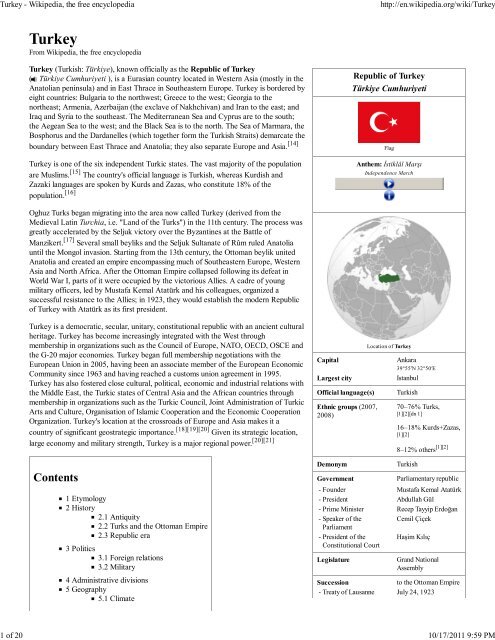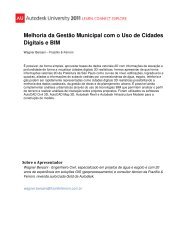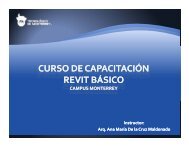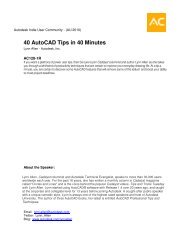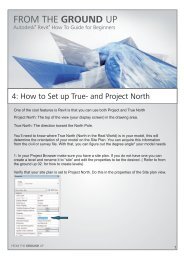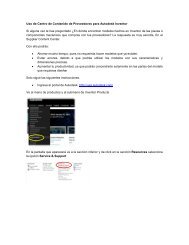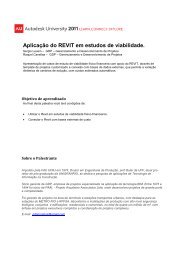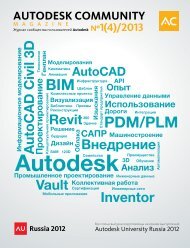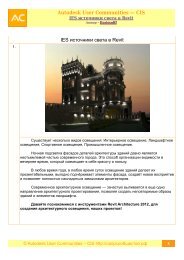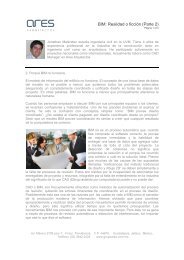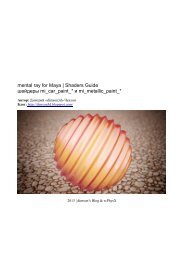Turkey - Wikipedia, the free encyclopedia - Autodesk International ...
Turkey - Wikipedia, the free encyclopedia - Autodesk International ...
Turkey - Wikipedia, the free encyclopedia - Autodesk International ...
You also want an ePaper? Increase the reach of your titles
YUMPU automatically turns print PDFs into web optimized ePapers that Google loves.
<strong>Turkey</strong> - <strong>Wikipedia</strong>, <strong>the</strong> <strong>free</strong> <strong>encyclopedia</strong><br />
http://en.wikipedia.org/wiki/<strong>Turkey</strong><br />
1 of 20 10/17/2011 9:59 PM<br />
From <strong>Wikipedia</strong>, <strong>the</strong> <strong>free</strong> <strong>encyclopedia</strong><br />
<strong>Turkey</strong> (Turkish: Türkiye), known officially as <strong>the</strong> Republic of <strong>Turkey</strong><br />
( Türkiye Cumhuriyeti ), is a Eurasian country located in Western Asia (mostly in <strong>the</strong><br />
Anatolian peninsula) and in East Thrace in Sou<strong>the</strong>astern Europe. <strong>Turkey</strong> is bordered by<br />
eight countries: Bulgaria to <strong>the</strong> northwest; Greece to <strong>the</strong> west; Georgia to <strong>the</strong><br />
nor<strong>the</strong>ast; Armenia, Azerbaijan (<strong>the</strong> exclave of Nakhchivan) and Iran to <strong>the</strong> east; and<br />
Iraq and Syria to <strong>the</strong> sou<strong>the</strong>ast. The Mediterranean Sea and Cyprus are to <strong>the</strong> south;<br />
<strong>the</strong> Aegean Sea to <strong>the</strong> west; and <strong>the</strong> Black Sea is to <strong>the</strong> north. The Sea of Marmara, <strong>the</strong><br />
Bosphorus and <strong>the</strong> Dardanelles (which toge<strong>the</strong>r form <strong>the</strong> Turkish Straits) demarcate <strong>the</strong><br />
boundary between East Thrace and Anatolia; <strong>the</strong>y also separate Europe and Asia. [14]<br />
<strong>Turkey</strong> is one of <strong>the</strong> six independent Turkic states. The vast majority of <strong>the</strong> population<br />
are Muslims. [15] The country's official language is Turkish, whereas Kurdish and<br />
Zazaki languages are spoken by Kurds and Zazas, who constitute 18% of <strong>the</strong><br />
population. [16]<br />
Republic of <strong>Turkey</strong><br />
Türkiye Cumhuriyeti<br />
Flag<br />
An<strong>the</strong>m: İstiklâl Marşı<br />
Independence March<br />
Oghuz Turks began migrating into <strong>the</strong> area now called <strong>Turkey</strong> (derived from <strong>the</strong><br />
Medieval Latin Turchia, i.e. "Land of <strong>the</strong> Turks") in <strong>the</strong> 11th century. The process was<br />
greatly accelerated by <strong>the</strong> Seljuk victory over <strong>the</strong> Byzantines at <strong>the</strong> Battle of<br />
Manzikert. [17] Several small beyliks and <strong>the</strong> Seljuk Sultanate of Rûm ruled Anatolia<br />
until <strong>the</strong> Mongol invasion. Starting from <strong>the</strong> 13th century, <strong>the</strong> Ottoman beylik united<br />
Anatolia and created an empire encompassing much of Sou<strong>the</strong>astern Europe, Western<br />
Asia and North Africa. After <strong>the</strong> Ottoman Empire collapsed following its defeat in<br />
World War I, parts of it were occupied by <strong>the</strong> victorious Allies. A cadre of young<br />
military officers, led by Mustafa Kemal Atatürk and his colleagues, organized a<br />
successful resistance to <strong>the</strong> Allies; in 1923, <strong>the</strong>y would establish <strong>the</strong> modern Republic<br />
of <strong>Turkey</strong> with Atatürk as its first president.<br />
<strong>Turkey</strong> is a democratic, secular, unitary, constitutional republic with an ancient cultural<br />
heritage. <strong>Turkey</strong> has become increasingly integrated with <strong>the</strong> West through<br />
membership in organizations such as <strong>the</strong> Council of Europe, NATO, OECD, OSCE and<br />
<strong>the</strong> G-20 major economies. <strong>Turkey</strong> began full membership negotiations with <strong>the</strong><br />
European Union in 2005, having been an associate member of <strong>the</strong> European Economic<br />
Community since 1963 and having reached a customs union agreement in 1995.<br />
<strong>Turkey</strong> has also fostered close cultural, political, economic and industrial relations with<br />
<strong>the</strong> Middle East, <strong>the</strong> Turkic states of Central Asia and <strong>the</strong> African countries through<br />
membership in organizations such as <strong>the</strong> Turkic Council, Joint Administration of Turkic<br />
Arts and Culture, Organisation of Islamic Cooperation and <strong>the</strong> Economic Cooperation<br />
Organization. <strong>Turkey</strong>'s location at <strong>the</strong> crossroads of Europe and Asia makes it a<br />
country of significant geostrategic importance. [18][19][20] Given its strategic location,<br />
large economy and military strength, <strong>Turkey</strong> is a major regional power. [20][21]<br />
Contents<br />
1 Etymology<br />
2 History<br />
2.1 Antiquity<br />
2.2 Turks and <strong>the</strong> Ottoman Empire<br />
2.3 Republic era<br />
3 Politics<br />
3.1 Foreign relations<br />
3.2 Military<br />
4 Administrative divisions<br />
5 Geography<br />
5.1 Climate<br />
Capital<br />
Largest city<br />
Official language(s)<br />
Ethnic groups (2007,<br />
2008)<br />
Demonym<br />
Ankara<br />
39°55′N 32°50′E<br />
Istanbul<br />
Turkish<br />
70–76% Turks,<br />
[1][2][dn 1]<br />
16–18% Kurds+Zazas,<br />
[1][2]<br />
8–12% o<strong>the</strong>rs [1][2]<br />
Turkish<br />
Government<br />
Parliamentary republic<br />
- Founder Mustafa Kemal Atatürk<br />
- President Abdullah Gül<br />
- Prime Minister Recep Tayyip Erdoğan<br />
- Speaker of <strong>the</strong><br />
Cemil Çiçek<br />
Parliament<br />
- President of <strong>the</strong> Haşim Kılıç<br />
Constitutional Court<br />
Legislature<br />
Location of <strong>Turkey</strong><br />
Grand National<br />
Assembly<br />
Succession<br />
to <strong>the</strong> Ottoman Empire<br />
- Treaty of Lausanne July 24, 1923
<strong>Turkey</strong> - <strong>Wikipedia</strong>, <strong>the</strong> <strong>free</strong> <strong>encyclopedia</strong><br />
http://en.wikipedia.org/wiki/<strong>Turkey</strong><br />
2 of 20 10/17/2011 9:59 PM<br />
Etymology<br />
6 Economy<br />
7 Demographics<br />
7.1 Urbanization<br />
7.2 Language<br />
7.3 Religion<br />
8 Culture<br />
8.1 Sports<br />
9 See also<br />
10 Footnotes<br />
11 References<br />
12 Bibliography<br />
13 Fur<strong>the</strong>r reading<br />
14 External links<br />
Main article: Name of <strong>Turkey</strong><br />
The name of <strong>Turkey</strong>, Türkiye in <strong>the</strong> Turkish language, can be divided into two<br />
components: <strong>the</strong> ethnonym Türk and <strong>the</strong> abstract suffix –iye meaning "owner", "land<br />
of" or "related to" (derived from <strong>the</strong> Arabic suffix –iyya, which is similar to <strong>the</strong> Greek<br />
and Latin suffixes –ia). The first recorded use of <strong>the</strong> term "Türk" or "Türük" as an<br />
autonym is contained in <strong>the</strong> Orkhon inscriptions of <strong>the</strong> Göktürks (Celestial Turks) of<br />
Central Asia (c. 8th century CE). The English word "<strong>Turkey</strong>" is derived from <strong>the</strong><br />
Medieval Latin Turchia (c. 1369). [22] The Greek cognate of this name, Tourkia, was<br />
originally used by <strong>the</strong> Byzantines to describe medieval Hungary [dn 2][23][24] (as <strong>the</strong><br />
Hungarians and Turks have ancestral links) but <strong>the</strong>y later began using this name to<br />
define <strong>the</strong> Seljuk-controlled parts of Anatolia in <strong>the</strong> centuries that followed <strong>the</strong> Battle<br />
of Manzikert in 1071.<br />
History<br />
Main article: History of <strong>Turkey</strong><br />
Antiquity<br />
- Declaration of Republic October 29, 1923<br />
Area<br />
- Total 783,562 km 2 (37th)<br />
302,535 sq mi<br />
- Water (%) 1.3<br />
Population<br />
- 2010 estimate 73,722,988 [3] (18th)<br />
- 2000 census 67,803,927 [4]<br />
- Density 94.1/km 2 (108th)<br />
239.8/sq mi<br />
GDP (PPP)<br />
2010 estimate<br />
- Total $1.116<br />
trillion [5][6] (15th)<br />
- Per capita $15,340 [7]<br />
GDP (nominal)<br />
2010 estimate<br />
- Total $735.264<br />
billion [8][9] (17th)<br />
- Per capita $10,106 [10]<br />
Gini (2008) 40 [11]<br />
HDI (2010)<br />
Currency<br />
0.679 [12] (high) (85th)<br />
Turkish lira [13] (TRY)<br />
Time zone<br />
EET (UTC+2)<br />
- Summer (DST) EEST (UTC+3)<br />
Date formats<br />
Drives on <strong>the</strong><br />
ISO 3166 code<br />
Internet TLD<br />
dd/mm/yyyy (AD)<br />
right<br />
TR<br />
.tr<br />
Calling code 90<br />
Main articles: History of Anatolia and Thrace#History<br />
The Anatolian peninsula, comprising most of modern <strong>Turkey</strong>, is one of <strong>the</strong> oldest continuously inhabited regions in <strong>the</strong> world. The earliest<br />
Neolithic settlements such as Çatalhöyük (Pottery Neolithic), Çayönü (Pre-Pottery Neolithic A to Pottery Neolithic), Nevalı Çori<br />
(Pre-Pottery Neolithic B), Hacılar (Pottery Neolithic), Göbekli Tepe (Pre-Pottery Neolithic A) and Mersin are considered to be among <strong>the</strong><br />
earliest human settlements in <strong>the</strong> world. [25]<br />
Portion of <strong>the</strong> legendary walls of Troy<br />
(VII), identified as <strong>the</strong> site of <strong>the</strong><br />
Trojan War (ca. 1200 BCE.)<br />
The settlement of Troy started in <strong>the</strong> Neolithic and continued into <strong>the</strong> Iron Age. Through recorded<br />
history, Anatolians have spoken Indo-European, Semitic and Kartvelian languages, as well as<br />
many languages of uncertain affiliation. In fact, given <strong>the</strong> antiquity of <strong>the</strong> Indo-European Hittite<br />
and Luwian languages, some scholars have proposed Anatolia as <strong>the</strong> hypo<strong>the</strong>tical center from<br />
which <strong>the</strong> Indo-European languages radiated. [26] The Hattians were an ancient people who<br />
inhabited <strong>the</strong> sou<strong>the</strong>astern part of Anatolia, noted at least as early as ca. 2300. Indo-European<br />
Hittites came to Anatolia and gradually absorbed Hattians ca. 2000–1700 BC. The first major<br />
empire in <strong>the</strong> area was founded by <strong>the</strong> Hittites, from <strong>the</strong> eighteenth through <strong>the</strong> 13th century BC.<br />
The Assyrians colonized parts of sou<strong>the</strong>astern <strong>Turkey</strong> as far back as 1950 BC until <strong>the</strong> year 612<br />
BC, when <strong>the</strong> Assyrian Empire was conquered by <strong>the</strong> Chaldean dynasty in Babylon. [27][28]<br />
Following <strong>the</strong> Hittite collapse, <strong>the</strong> Phrygians, an Indo-European people, achieved ascendancy until<br />
<strong>the</strong>ir kingdom was destroyed by <strong>the</strong> Cimmerians in <strong>the</strong> 7th century BC. [29] The most powerful of<br />
Phrygia's successor states were Lydia, Caria and Lycia. The Lydians and Lycians spoke languages<br />
that were fundamentally Indo-European, but both languages had acquired non-Indo-European
<strong>Turkey</strong> - <strong>Wikipedia</strong>, <strong>the</strong> <strong>free</strong> <strong>encyclopedia</strong><br />
http://en.wikipedia.org/wiki/<strong>Turkey</strong><br />
3 of 20 10/17/2011 9:59 PM<br />
elements prior to <strong>the</strong> Hittite and Hellenistic periods.<br />
Starting around 1200 BC, <strong>the</strong> coast of Anatolia was heavily settled by Aeolian and Ionian Greeks.<br />
Numerous important cities were founded by <strong>the</strong>se colonists, such as Miletus, Ephesus, Smyrna<br />
(modern İzmir), and Byzantium (later Constantinople and Istanbul). The first state established in<br />
Anatolia that was called Armenia by neighboring peoples (Hecataeus of Miletus and Behistun<br />
Inscription) was <strong>the</strong> state of <strong>the</strong> Armenian Orontid dynasty. Anatolia was conquered by <strong>the</strong><br />
Persian Achaemenid Empire during <strong>the</strong> 6th and 5th centuries BC and later fell to Alexander <strong>the</strong><br />
Great in 334 BC. [30] Anatolia was subsequently divided into a number of small Hellenistic<br />
kingdoms (including Bithynia, Cappadocia, Pergamum, and Pontus), all of which had succumbed<br />
to <strong>the</strong> Roman Republic by <strong>the</strong> mid-1st century BC. [31] Arsacid Armenia, <strong>the</strong> first state to accept<br />
Christianity as official religion had lands in Anatolia.<br />
In 324, <strong>the</strong> Roman emperor Constantine I chose Byzantium to be <strong>the</strong> new capital of <strong>the</strong> Roman<br />
Empire, renaming it New Rome (later Constantinople and Istanbul). After <strong>the</strong> fall of <strong>the</strong> Western<br />
Roman Empire, it became <strong>the</strong> capital of <strong>the</strong> Byzantine Empire (Eastern Roman Empire). [32]<br />
The Celsus Library in Ephesus, dating<br />
from 135 AD.<br />
Turks and <strong>the</strong> Ottoman Empire<br />
Main articles: Turkic migration, Great Seljuq Empire, and Ottoman Empire<br />
The House of Seljuk was a branch of <strong>the</strong> Kınık Oğuz Turks who resided on <strong>the</strong><br />
periphery of <strong>the</strong> Muslim world, north of <strong>the</strong> Caspian and Aral Seas in <strong>the</strong> Yabghu<br />
Khaganate of <strong>the</strong> Oğuz confederacy [33] in <strong>the</strong> 10th century. In <strong>the</strong> 11th century, <strong>the</strong><br />
Seljuks started migrating from <strong>the</strong>ir ancestral homelands towards <strong>the</strong> eastern regions<br />
of Anatolia, which eventually became <strong>the</strong> new homeland of Oghuz Turkic tribes<br />
[citation needed]<br />
following <strong>the</strong> Battle of Manzikert in 1071.<br />
The victory of <strong>the</strong> Seljuks gave rise to <strong>the</strong> Anatolian Seljuk Sultanate; which<br />
developed as a separate branch of <strong>the</strong> larger Seljuk Empire that covered parts of<br />
Central Asia, Iran, Anatolia and Southwest Asia. [34]<br />
In 1243, <strong>the</strong> Seljuk armies were defeated by <strong>the</strong> Mongols, causing <strong>the</strong> Seljuk empire's<br />
power to slowly disintegrate. In its wake, one of <strong>the</strong> Turkish principalities governed by<br />
Osman I would, over <strong>the</strong> next 200 years, evolve into <strong>the</strong> Ottoman Empire, expanding<br />
throughout Anatolia, <strong>the</strong> Balkans and <strong>the</strong> Levant. [35] In 1453, <strong>the</strong> Ottomans<br />
completed <strong>the</strong>ir conquest of <strong>the</strong> Byzantine Empire by capturing its capital,<br />
Constantinople.<br />
Ottoman territories acquired between 1481 and<br />
1683.<br />
The Selimiye Mosque in Edirne is one<br />
of <strong>the</strong> most famous architectural<br />
legacies of <strong>the</strong> Ottoman Empire.<br />
The Ottoman Empire's power and prestige peaked in <strong>the</strong> 16th and 17th centuries, particularly<br />
during <strong>the</strong> reign of Suleiman <strong>the</strong> Magnificent. The empire was often at odds with <strong>the</strong> Holy Roman<br />
Empire in its steady advance towards Central Europe through <strong>the</strong> Balkans and <strong>the</strong> sou<strong>the</strong>rn part of<br />
<strong>the</strong> Polish-Lithuanian Commonwealth. [19] At sea, <strong>the</strong> empire contended with <strong>the</strong> Holy Leagues,<br />
composed of Habsburg Spain, <strong>the</strong> Republic of Venice and <strong>the</strong> Knights of St. John, for control of<br />
<strong>the</strong> Mediterranean. In <strong>the</strong> Indian Ocean, <strong>the</strong> Ottoman navy frequently confronted Portuguese<br />
fleets in order to defend its traditional monopoly over <strong>the</strong> maritime trade routes between East Asia<br />
and Western Europe; <strong>the</strong>se routes faced new competition with <strong>the</strong> Portuguese discovery of <strong>the</strong><br />
Cape of Good Hope in 1488. In addition, <strong>the</strong> Ottomans were occasionally at war with Persia over<br />
territorial disputes or caused by religious differences between 16th and 18th centuries. [36]<br />
During nearly two centuries of decline, <strong>the</strong> Ottoman Empire gradually shrank in size, military<br />
power, and wealth. It entered World War I on <strong>the</strong> side of <strong>the</strong> Central Powers and was ultimately<br />
defeated. During <strong>the</strong> war, an estimated 1.5 million Armenians were deported and exterminated in <strong>the</strong> Armenian Genocide. [37][38] The<br />
Turkish government denies that <strong>the</strong>re was an Armenian genocide and claims that Armenians were only relocated from <strong>the</strong> eastern war<br />
zone. [39] Large scale massacres were also committed against <strong>the</strong> empire's o<strong>the</strong>r minority groups such as <strong>the</strong> Greeks and Assyrians.<br />
[40][41][42] Following <strong>the</strong> Armistice of Mudros on October 30, 1918, <strong>the</strong> victorious Allied Powers sought to partition <strong>the</strong> Ottoman state<br />
through <strong>the</strong> 1920 Treaty of Sèvres. [35]<br />
Republic era
<strong>Turkey</strong> - <strong>Wikipedia</strong>, <strong>the</strong> <strong>free</strong> <strong>encyclopedia</strong><br />
http://en.wikipedia.org/wiki/<strong>Turkey</strong><br />
4 of 20 10/17/2011 9:59 PM<br />
Main articles: History of <strong>the</strong> Republic of <strong>Turkey</strong> and Atatürk's Reforms<br />
The Occupation of Constantinople and Smyrna by <strong>the</strong> Allies in <strong>the</strong> aftermath of World War I<br />
prompted <strong>the</strong> establishment of <strong>the</strong> Turkish national movement. [19] Under <strong>the</strong> leadership of<br />
Mustafa Kemal Pasha, a military commander who had distinguished himself during <strong>the</strong> Battle of<br />
Gallipoli, <strong>the</strong> Turkish War of Independence was waged with <strong>the</strong> aim of revoking <strong>the</strong> terms of <strong>the</strong><br />
Treaty of Sèvres. [18]<br />
By September 18, 1922, <strong>the</strong> occupying armies were expelled, and <strong>the</strong> new Turkish state was<br />
established. On November 1, <strong>the</strong> newly founded parliament formally abolished <strong>the</strong> Sultanate, thus<br />
ending 623 years of Ottoman rule. The Treaty of Lausanne of July 24, 1923, led to <strong>the</strong><br />
international recognition of <strong>the</strong> sovereignty of <strong>the</strong> newly formed "Republic of <strong>Turkey</strong>" as <strong>the</strong><br />
successor state of <strong>the</strong> Ottoman Empire, and <strong>the</strong> republic was officially proclaimed on October 29,<br />
1923, in <strong>the</strong> new capital of Ankara. [19]<br />
Mustafa Kemal became <strong>the</strong> republic's first President of <strong>Turkey</strong> and subsequently introduced many<br />
radical reforms with <strong>the</strong> aim of founding a new secular republic from <strong>the</strong> remnants of its Ottoman<br />
past. [19] According to <strong>the</strong> Surname Law of 1934, <strong>the</strong> Turkish parliament presented Mustafa Kemal<br />
with <strong>the</strong> honorific surname "Atatürk" (Fa<strong>the</strong>r of <strong>the</strong> Turks) in 1934. [18]<br />
Roosevelt, İnönü and Churchill at <strong>the</strong><br />
Second Cairo Conference which was<br />
held between December 4–6, 1943.<br />
recognised by <strong>Turkey</strong> was established. [46]<br />
Mustafa Kemal Atatürk, founder and<br />
first President of <strong>the</strong> Republic of<br />
<strong>Turkey</strong>.<br />
<strong>Turkey</strong> remained neutral during most of World War II but<br />
entered on <strong>the</strong> side of <strong>the</strong> Allies on February 23, 1945, as a ceremonial gesture and in 1945<br />
became a charter member of <strong>the</strong> United Nations. [43] Difficulties faced by Greece after <strong>the</strong> war in<br />
quelling a communist rebellion, along with demands by <strong>the</strong> Soviet Union for military bases in <strong>the</strong><br />
Turkish Straits, prompted <strong>the</strong> United States to declare <strong>the</strong> Truman Doctrine in 1947. The doctrine<br />
enunciated American intentions to guarantee <strong>the</strong> security of <strong>Turkey</strong> and Greece, and resulted in<br />
large-scale U.S. military and economic support. [44]<br />
After participating with <strong>the</strong> United Nations forces in <strong>the</strong> Korean War, <strong>Turkey</strong> joined NATO in<br />
1952, becoming a bulwark against Soviet expansion into <strong>the</strong> Mediterranean. Following a decade of<br />
Cypriot intercommunal violence and <strong>the</strong> Greek military coup of 15 July 1974, overthrowing<br />
President Makarios and installing Nikos Sampson as dictator, <strong>Turkey</strong> invaded <strong>the</strong> island Republic<br />
of Cyprus on 20 July. [45] Nine years later <strong>the</strong> Turkish Republic of Nor<strong>the</strong>rn Cyprus which is only<br />
The single-party period ended in 1945. It was followed by a tumultuous transition to multiparty democracy over <strong>the</strong> next few decades,<br />
which was interrupted by military coups d'état in 1960, 1971, 1980 and 1997. [47] In 1984, <strong>the</strong> PKK began an insurgency against <strong>the</strong><br />
Turkish government; <strong>the</strong> conflict, which has claimed over 40,000 lives, continues today. [48] Since <strong>the</strong> liberalization of <strong>the</strong> Turkish<br />
economy during <strong>the</strong> 1980s, <strong>the</strong> country has enjoyed stronger economic growth and greater political stability. [49]<br />
Politics<br />
Main articles: Politics of <strong>Turkey</strong>, Constitution of <strong>Turkey</strong>, and Elections in <strong>Turkey</strong><br />
<strong>Turkey</strong> is a parliamentary representative democracy. Since its foundation as a republic in 1923, <strong>Turkey</strong> has<br />
developed a strong tradition of secularism. [50] <strong>Turkey</strong>'s constitution governs <strong>the</strong> legal framework of <strong>the</strong><br />
country. It sets out <strong>the</strong> main principles of government and establishes <strong>Turkey</strong> as a unitary centralized state.<br />
The President of <strong>the</strong> Republic is <strong>the</strong> head of state and has a largely ceremonial role. The president is<br />
elected for a five-year term by direct elections. Abdullah Gül was elected as president on August 28, 2007,<br />
by a popular parliament round of votes, succeeding Ahmet Necdet Sezer. [51]<br />
Executive power is exercised by <strong>the</strong> Prime Minister and <strong>the</strong> Council of Ministers which make up <strong>the</strong><br />
government, while <strong>the</strong> legislative power is vested in <strong>the</strong> unicameral parliament, <strong>the</strong> Grand National<br />
Assembly of <strong>Turkey</strong>. The judiciary is independent of <strong>the</strong> executive and <strong>the</strong> legislature, and <strong>the</strong><br />
Constitutional Court is charged with ruling on <strong>the</strong> conformity of laws and decrees with <strong>the</strong> constitution.<br />
The Council of State is <strong>the</strong> tribunal of last resort for administrative cases, and <strong>the</strong> High Court of Appeals<br />
for all o<strong>the</strong>rs. [52]<br />
The prime minister is elected by <strong>the</strong> parliament through a vote of confidence in <strong>the</strong> government and is<br />
The Grand Chamber of <strong>the</strong><br />
Grand National Assembly of<br />
<strong>Turkey</strong> in Ankara.
<strong>Turkey</strong> - <strong>Wikipedia</strong>, <strong>the</strong> <strong>free</strong> <strong>encyclopedia</strong><br />
http://en.wikipedia.org/wiki/<strong>Turkey</strong><br />
5 of 20 10/17/2011 9:59 PM<br />
most often <strong>the</strong> head of <strong>the</strong> party having <strong>the</strong> most seats in parliament. The current prime minister is <strong>the</strong> former mayor of İstanbul, Recep<br />
Tayyip Erdoğan, whose conservative Justice and Development Party won an absolute majority of parliamentary seats in <strong>the</strong> 2002 general<br />
elections, organized in <strong>the</strong> aftermath of <strong>the</strong> economic crisis of 2001, with 34% of <strong>the</strong> suffrage. [53]<br />
In <strong>the</strong> 2007 general elections, <strong>the</strong> AKP received 46.6% of <strong>the</strong> votes and could defend its majority in<br />
parliament. [54] Although <strong>the</strong> ministers do not have to be members of <strong>the</strong> parliament, ministers with<br />
parliament membership are common in Turkish politics. In 2007, a series of events regarding state<br />
secularism and <strong>the</strong> role of <strong>the</strong> judiciary in <strong>the</strong> legislature has occurred. These included <strong>the</strong> controversial<br />
presidential election of Abdullah Gül, who in <strong>the</strong> past had been involved with Islamist parties; [55] and <strong>the</strong><br />
government's proposal to lift <strong>the</strong> headscarf ban in universities, which was annulled by <strong>the</strong> Constitutional<br />
Court, leading to a fine and a near ban of <strong>the</strong> ruling party. [56]<br />
Universal suffrage for both sexes has been applied throughout <strong>Turkey</strong> since 1933, and every Turkish<br />
citizen who has turned 18 years of age has <strong>the</strong> right to vote. As of 2004, <strong>the</strong>re were 50 registered political<br />
parties in <strong>the</strong> country. [57] The Constitutional Court can strip <strong>the</strong> public financing of political parties that it<br />
deems anti-secular or separatist, or ban <strong>the</strong>ir existence altoge<strong>the</strong>r. [58][59]<br />
Recep Tayyip Erdoğan has<br />
been elected three times as<br />
Prime Minister: In 2002<br />
(with 34% of <strong>the</strong> popular<br />
vote), in 2007 (with 47%)<br />
and in 2011 (with 49%).<br />
There are 550 members of parliament who are elected for a four-year term by a party-list proportional<br />
representation system from 85 electoral districts which represent <strong>the</strong> 81 administrative provinces of<br />
<strong>Turkey</strong> (İstanbul is divided into three electoral districts, whereas Ankara and İzmir are divided into two<br />
each because of <strong>the</strong>ir large populations). To avoid a hung parliament and its excessive political<br />
fragmentation, only parties winning at least 10% of <strong>the</strong> votes cast in a national parliamentary election gain<br />
<strong>the</strong> right to representation in <strong>the</strong> parliament. [57] Because of this threshold, in <strong>the</strong> 2007 elections only three<br />
parties formally entered <strong>the</strong> parliament (compared to two in 2002). [60][61]<br />
Human rights in <strong>Turkey</strong> have been <strong>the</strong> subject of much controversy and international condemnation. Between 1998 and 2008 <strong>the</strong><br />
European Court of Human Rights made more than 1,600 judgements against <strong>Turkey</strong> for human rights violations, particularly <strong>the</strong> right to<br />
life and <strong>free</strong>dom from torture. O<strong>the</strong>r issues such as Kurdish rights, women's rights and press <strong>free</strong>dom have also attracted controversy.<br />
<strong>Turkey</strong>'s human rights record continues to be a significant obstacle to future membership of <strong>the</strong> EU. [62] The Turkish Journalists<br />
Association says that 58 of <strong>the</strong> country's journalists have been imprisoned. A former U.S. State Department spokesman, Philip Crowley,<br />
said that <strong>the</strong> United States had "broad concerns about trends involving intimidation of journalists in <strong>Turkey</strong>." [63]<br />
Foreign relations<br />
Main articles: Foreign relations of <strong>Turkey</strong> and Accession of <strong>Turkey</strong> to <strong>the</strong> European Union<br />
<strong>Turkey</strong> is a founding member of <strong>the</strong> United Nations (1945), <strong>the</strong> OECD (1961), <strong>the</strong> OIC (1969), <strong>the</strong><br />
OSCE (1973), <strong>the</strong> ECO (1985), <strong>the</strong> BSEC (1992) and <strong>the</strong> G-20 major economies (1999). On<br />
October 17, 2008, <strong>Turkey</strong> was elected as a non-permanent member of <strong>the</strong> United Nations Security<br />
Council. [64] <strong>Turkey</strong>'s membership of <strong>the</strong> council effectively began on January 1, 2009. [64] <strong>Turkey</strong><br />
had previously been a member of <strong>the</strong> U.N. Security Council in 1951–1952, 1954–1955 and<br />
1961. [64]<br />
In line with its traditional Western orientation, relations with Europe have always been a central<br />
part of Turkish foreign policy. <strong>Turkey</strong> became a founding member of <strong>the</strong> Council of Europe in<br />
1949, applied for associate membership of <strong>the</strong> EEC (predecessor of <strong>the</strong> European Union) in 1959<br />
and became an associate member in 1963. After decades of political negotiations, <strong>Turkey</strong> applied<br />
for full membership of <strong>the</strong> EEC in 1987, became an associate member of <strong>the</strong> Western European<br />
Union in 1992, reached a Customs Union agreement with <strong>the</strong> EU in 1995 and has been in formal<br />
accession negotiations with <strong>the</strong> EU since 2005. [65]<br />
<strong>Turkey</strong> began full membership<br />
negotiations with <strong>the</strong> European Union<br />
in 2005, having been an associate<br />
member of <strong>the</strong> EEC since 1963.<br />
Since 1974 <strong>Turkey</strong> has not recognized <strong>the</strong> (essentially Greek Cypriot) Republic of Cyprus as <strong>the</strong><br />
sole authority on <strong>the</strong> island, but instead supports <strong>the</strong> Turkish Cypriot community in <strong>the</strong> form of <strong>the</strong><br />
de facto Turkish Republic of Nor<strong>the</strong>rn Cyprus which is recognized only by <strong>Turkey</strong>. [66]<br />
The o<strong>the</strong>r defining aspect of <strong>Turkey</strong>'s foreign relations has been its ties with <strong>the</strong> United States.<br />
Based on <strong>the</strong> common threat posed by <strong>the</strong> Soviet Union, <strong>Turkey</strong> joined NATO in 1952, ensuring<br />
close bilateral relations with Washington throughout <strong>the</strong> Cold War. In <strong>the</strong> post–Cold War<br />
environment, <strong>Turkey</strong>'s geostrategic importance shifted towards its proximity to <strong>the</strong> Middle East,<br />
<strong>the</strong> Caucasus and <strong>the</strong> Balkans. In return, <strong>Turkey</strong> has benefited from <strong>the</strong> United States' political,<br />
<strong>Turkey</strong> is a founding member of <strong>the</strong><br />
OECD and <strong>the</strong> G-20 major economies.
<strong>Turkey</strong> - <strong>Wikipedia</strong>, <strong>the</strong> <strong>free</strong> <strong>encyclopedia</strong><br />
http://en.wikipedia.org/wiki/<strong>Turkey</strong><br />
economic and diplomatic support, including in key issues such as <strong>the</strong> country's bid to join <strong>the</strong> European Union.<br />
The independence of <strong>the</strong> Turkic states of <strong>the</strong> Soviet Union in 1991, with which <strong>Turkey</strong> shares a common cultural and linguistic heritage,<br />
allowed <strong>Turkey</strong> to extend its economic and political relations deep into Central Asia, [67] thus enabling <strong>the</strong> completion of a multi-billiondollar<br />
oil and natural gas pipeline from Baku in Azerbaijan to <strong>the</strong> port of Ceyhan in <strong>Turkey</strong>. The Baku–Tbilisi–Ceyhan pipeline forms part<br />
of <strong>Turkey</strong>'s foreign policy strategy to become an energy conduit to <strong>the</strong> West. However, <strong>Turkey</strong>'s border with Armenia, a state in <strong>the</strong><br />
Caucasus, remains closed following its occupation of Azeri territory during <strong>the</strong> Nagorno-Karabakh War. [68]<br />
Military<br />
Main article: Turkish Armed Forces<br />
The Turkish Armed Forces consists of <strong>the</strong> Army, <strong>the</strong> Navy and <strong>the</strong> Air Force. The Gendarmerie<br />
and <strong>the</strong> Coast Guard operate as parts of <strong>the</strong> Ministry of Internal Affairs in peacetime, although<br />
<strong>the</strong>y are subordinated to <strong>the</strong> Army and Navy Commands respectively in wartime, during which<br />
<strong>the</strong>y have both internal law enforcement and military functions. [69]<br />
The Turkish Armed Forces is <strong>the</strong> second largest standing armed force in NATO, after <strong>the</strong> U.S.<br />
Armed Forces, with a combined strength of just over a million uniformed personnel serving in its<br />
five branches. [70] <strong>Turkey</strong> is considered to be <strong>the</strong> strongest military power of <strong>the</strong> Middle East<br />
region besides Israel. [21]<br />
<strong>Turkey</strong> joined NATO in 1952.<br />
Every fit male Turkish citizen o<strong>the</strong>rwise not barred is required to serve in <strong>the</strong> military for a period ranging from three weeks to fifteen<br />
months, dependent on education and job location. [71] <strong>Turkey</strong> does not recognise conscientious objection and does not offer a civilian<br />
alternative to military service. [72]<br />
<strong>Turkey</strong> is one of five NATO member states which are part<br />
of <strong>the</strong> nuclear sharing policy of <strong>the</strong> alliance, toge<strong>the</strong>r with<br />
Belgium, Germany, Italy, and <strong>the</strong> Ne<strong>the</strong>rlands. [73] A total<br />
of 90 B61 nuclear bombs are hosted at <strong>the</strong> Incirlik Air<br />
Base, 40 of which are allocated for use by <strong>the</strong> Turkish Air<br />
Force. [74]<br />
Boeing 737 AEW&C MESA Peace<br />
Eagle of <strong>the</strong> Turkish Air Force.<br />
In 1998, <strong>Turkey</strong> announced a program of modernization<br />
worth US$160 billion over a twenty year period in various<br />
projects including tanks, fighter jets, helicopters,<br />
submarines, warships and assault rifles. [75] <strong>Turkey</strong> is a Level 3 contributor to <strong>the</strong> Joint Strike<br />
Fighter (JSF) program. [76]<br />
<strong>Turkey</strong> has maintained forces in international missions under <strong>the</strong> United Nations and NATO since<br />
1950, including peacekeeping missions in Somalia and former Yugoslavia, and support to coalition<br />
forces in <strong>the</strong> First Gulf War. <strong>Turkey</strong> maintains 36,000 troops in nor<strong>the</strong>rn Cyprus; <strong>the</strong>ir presence is<br />
supported and approved by <strong>the</strong> de facto local government, but <strong>the</strong> Republic of Cyprus and <strong>the</strong><br />
international community regard it as an illegal occupation force, and its presence has also been<br />
denounced in several United Nations Security Council resolutions. [77] <strong>Turkey</strong> has had troops<br />
deployed in Afghanistan as part of <strong>the</strong> U.S. stabilization force and <strong>the</strong> UN-authorized,<br />
NATO-commanded <strong>International</strong> Security Assistance Force (ISAF) since 2001. [70][78] In 2006, <strong>the</strong><br />
Turkish parliament deployed a peacekeeping force of Navy patrol vessels and around 700 ground<br />
troops as part of an expanded United Nations Interim Force in Lebanon (UNIFIL) in <strong>the</strong> wake of<br />
<strong>the</strong> Israeli-Lebanon conflict. [79]<br />
<strong>Turkey</strong> is one of nine partner states of<br />
<strong>the</strong> F-35 Joint Strike Fighter (JSF)<br />
development and production program.<br />
Four MEKO 200 TN type frigates of<br />
<strong>the</strong> Turkish Navy in formation.<br />
The Chief of <strong>the</strong> General Staff is appointed by <strong>the</strong> president and is responsible to <strong>the</strong> prime minister. The Council of Ministers is<br />
responsible to parliament for matters of national security and <strong>the</strong> adequate preparation of <strong>the</strong> armed forces to defend <strong>the</strong> country.<br />
However, <strong>the</strong> authority to declare war and to deploy <strong>the</strong> Turkish Armed Forces to foreign countries or to allow foreign armed forces to be<br />
stationed in <strong>Turkey</strong> rests solely with <strong>the</strong> parliament. [69] The actual commander of <strong>the</strong> armed forces is <strong>the</strong> Chief of <strong>the</strong> General Staff<br />
General Necdet Özel since August 4, 2011. [80]<br />
Administrative divisions<br />
6 of 20 10/17/2011 9:59 PM
<strong>Turkey</strong> - <strong>Wikipedia</strong>, <strong>the</strong> <strong>free</strong> <strong>encyclopedia</strong><br />
http://en.wikipedia.org/wiki/<strong>Turkey</strong><br />
7 of 20 10/17/2011 9:59 PM<br />
Main articles: List of regions of <strong>Turkey</strong>, Provinces of <strong>Turkey</strong>, Districts of <strong>Turkey</strong>, and List of cities in <strong>Turkey</strong><br />
Kırklareli<br />
The capital city of <strong>Turkey</strong> is Ankara. The territory of<br />
Bartın Sinop<br />
Edirne Istanbul<br />
<strong>Turkey</strong> is subdivided into 81 provinces for administrative Tekirdağ Zonguldak Kastamonu<br />
Kocaeli Düzce Karabük Samsun Rize<br />
Artvin Ardahan<br />
YalovaSakarya<br />
purposes. The provinces are organized into 7 regions for Çanakkale<br />
Bolu Çankırı Amasya Ordu Giresun Trabzon<br />
Bursa<br />
Çorum<br />
Gümüşhane Kars<br />
Bilecik<br />
census purposes; however, <strong>the</strong>y do not represent an<br />
Ankara<br />
Tokat Bayburt<br />
Balıkesir<br />
Erzurum<br />
Eskişehir Kırıkkale<br />
administrative structure. Each province is divided into<br />
Kütahya<br />
Yozgat Sivas Erzincan Ağrı Iğdır<br />
Kırşehir<br />
Manisa<br />
Tunceli<br />
districts, for a total of 923 districts.<br />
İzmir Uşak Afyon<br />
BingölMuş<br />
Nevşehir<br />
Kayseri<br />
Elâzığ<br />
AydınDenizli<br />
Isparta Konya<br />
Aksaray<br />
Malatya BatmanBitlis<br />
Van<br />
K. Maraş Diyarbakır<br />
Provinces usually bear <strong>the</strong> same name as <strong>the</strong>ir provincial<br />
Niğde<br />
Siirt<br />
Burdur<br />
Adıyaman<br />
Hakkâ<br />
Osmaniye<br />
capitals, also called <strong>the</strong> central district; exceptions to this<br />
Muğla<br />
Karaman<br />
Antalya<br />
Adana GaziantepŞanlıurfa<br />
Mardin Şırnak<br />
custom are <strong>the</strong> provinces of Hatay (capital: Antakya),<br />
Mersin Kilis<br />
Hatay<br />
Kocaeli (capital: İzmit) and Sakarya (capital: Adapazarı).<br />
Provinces with <strong>the</strong> largest populations are Istanbul (13<br />
million), Ankara (5 million), İzmir (4 million), Bursa (3 million) and Adana (2 million).<br />
The biggest city and <strong>the</strong> pre-Republican capital Istanbul is <strong>the</strong> financial, economic and cultural heart of <strong>the</strong> country. [81] An estimated<br />
75.5% of <strong>Turkey</strong>'s population live in urban centers. [82] In all, 19 provinces have populations that exceed 1 million inhabitants, and 20<br />
provinces have populations between 1 million and 500,000 inhabitants. Only two provinces have populations less than 100,000.<br />
Geography<br />
Main article: Geography of <strong>Turkey</strong><br />
<strong>Turkey</strong> is a transcontinental [83] Eurasian country. Asian <strong>Turkey</strong> (made up largely of Anatolia),<br />
which includes 97% of <strong>the</strong> country, is separated from European <strong>Turkey</strong> by <strong>the</strong> Bosphorus, <strong>the</strong> Sea<br />
of Marmara, and <strong>the</strong> Dardanelles (which toge<strong>the</strong>r form a water link between <strong>the</strong> Black Sea and <strong>the</strong><br />
Mediterranean). European <strong>Turkey</strong> (eastern Thrace or Rumelia in <strong>the</strong> Balkan peninsula) comprises<br />
3% of <strong>the</strong> country. [84]<br />
Bosphorus Bridge in Istanbul,<br />
connecting Europe (left) and Asia<br />
(right.)<br />
The territory of <strong>Turkey</strong> is more than 1,600 kilometres (1,000 mi) long and 800 km (500 mi) wide,<br />
with a roughly rectangular shape. [81] It lies between latitudes 35° and 43° N, and longitudes 25°<br />
and 45° E. <strong>Turkey</strong>'s area, including lakes, occupies 783,562 [85] square kilometres (300,948 sq mi), of which 755,688 square kilometres<br />
(291,773 sq mi) are in Southwest Asia and 23,764 square kilometres (9,174 sq mi) in Europe. [81] <strong>Turkey</strong> is <strong>the</strong> world's 37th-largest<br />
country in terms of area. The country is encircled by seas on three sides: <strong>the</strong> Aegean Sea to <strong>the</strong> west, <strong>the</strong> Black Sea to <strong>the</strong> north and <strong>the</strong><br />
Mediterranean to <strong>the</strong> south. <strong>Turkey</strong> also contains <strong>the</strong> Sea of Marmara in <strong>the</strong> northwest. [86]<br />
The European section of <strong>Turkey</strong>, East Thrace, forms <strong>the</strong> borders of <strong>Turkey</strong> with Greece and<br />
Bulgaria. The Asian part of <strong>the</strong> country, Anatolia, consists of a high central plateau with narrow<br />
coastal plains, between <strong>the</strong> Köroğlu and Pontic mountain ranges to <strong>the</strong> north and <strong>the</strong> Taurus<br />
Mountains to <strong>the</strong> south. Eastern <strong>Turkey</strong> has a more mountainous landscape and is home to <strong>the</strong><br />
sources of rivers such as <strong>the</strong> Euphrates, Tigris and Aras, and contains Lake Van and Mount Ararat,<br />
<strong>Turkey</strong>'s highest point at 5,165 metres (16,946 ft). [86][87] Lake Tuz, <strong>Turkey</strong>'s third-largest lake, is a<br />
macroscopically visible feature in <strong>the</strong> middle of <strong>the</strong> country.<br />
Ölüdeniz Beach near Fethiye on <strong>the</strong><br />
Turkish Riviera.<br />
<strong>Turkey</strong> is divided into seven census regions: Marmara, Aegean, Black Sea, Central Anatolia,<br />
Eastern Anatolia, Sou<strong>the</strong>astern Anatolia and <strong>the</strong> Mediterranean. The uneven north Anatolian<br />
terrain running along <strong>the</strong> Black Sea resembles a long, narrow belt. This region comprises<br />
approximately one-sixth of <strong>Turkey</strong>'s total land area. As a general trend, <strong>the</strong> inland Anatolian<br />
plateau becomes increasingly rugged as it progresses eastward. [86]<br />
<strong>Turkey</strong>'s varied landscapes are <strong>the</strong> product of complex earth movements that have shaped <strong>the</strong><br />
region over thousands of years and still manifest <strong>the</strong>mselves in fairly frequent earthquakes and<br />
occasional volcanic eruptions. The Bosporus and <strong>the</strong> Dardanelles owe <strong>the</strong>ir existence to <strong>the</strong> fault<br />
lines running through <strong>Turkey</strong> that led to <strong>the</strong> creation of <strong>the</strong> Black Sea. There is an earthquake fault<br />
line across <strong>the</strong> north of <strong>the</strong> country from west to east, which caused a major earthquake in<br />
1999. [88]<br />
Climate
<strong>Turkey</strong> - <strong>Wikipedia</strong>, <strong>the</strong> <strong>free</strong> <strong>encyclopedia</strong><br />
http://en.wikipedia.org/wiki/<strong>Turkey</strong><br />
8 of 20 10/17/2011 9:59 PM<br />
See also: Climate of <strong>Turkey</strong> and Environmental issues in <strong>Turkey</strong><br />
The coastal areas of <strong>Turkey</strong> bordering <strong>the</strong> Aegean Sea and <strong>the</strong> Mediterranean Sea have a<br />
temperate Mediterranean climate, with hot, dry summers and mild to cool, wet winters. The<br />
coastal areas of <strong>Turkey</strong> bordering <strong>the</strong> Black Sea have a temperate Oceanic climate with warm, wet<br />
Mount Ararat (Ağrı Dağı) is <strong>the</strong><br />
highest peak in <strong>Turkey</strong> at 5,165 m<br />
(16,946 ft.)<br />
summers and cool to cold, wet winters. The Turkish Black Sea coast receives <strong>the</strong> greatest amount of precipitation and is <strong>the</strong> only region of<br />
<strong>Turkey</strong> that receives high precipitation throughout <strong>the</strong> year. The eastern part of that coast averages 2,500 millimeters annually which is<br />
<strong>the</strong> highest precipitation in <strong>the</strong> country.<br />
The coastal areas of <strong>Turkey</strong> bordering <strong>the</strong> Sea of Marmara (including Istanbul), which connects <strong>the</strong> Aegean Sea and <strong>the</strong> Black Sea, have a<br />
transitional climate between a temperate Mediterranean climate and a temperate Oceanic climate with warm to hot, moderately dry<br />
summers and cool to cold, wet winters. Snow does occur on <strong>the</strong> coastal areas of <strong>the</strong> Sea of Marmara and <strong>the</strong> Black Sea almost every<br />
winter, but it usually lies no more than a few days. Snow on <strong>the</strong> o<strong>the</strong>r hand is rare in <strong>the</strong> coastal areas of <strong>the</strong> Aegean Sea and very rare in<br />
<strong>the</strong> coastal areas of <strong>the</strong> Mediterranean Sea.<br />
Conditions can be much harsher in <strong>the</strong> more arid interior. Mountains close to <strong>the</strong> coast prevent Mediterranean influences from extending<br />
inland, giving <strong>the</strong> central Anatolian plateau of <strong>the</strong> interior of <strong>Turkey</strong> a continental climate with sharply contrasting seasons.<br />
Winters on <strong>the</strong> plateau are especially severe. Temperatures of −30 °C to −40 °C (−22 °F to −40 °F) can occur in eastern Anatolia, and<br />
snow may lie on <strong>the</strong> ground at least 120 days of <strong>the</strong> year. In <strong>the</strong> west, winter temperatures average below 1 °C (34 °F). Summers are hot<br />
and dry, with temperatures generally above 30 °C (86 °F) in <strong>the</strong> day. Annual precipitation averages about 400 millimetres (15 in), with<br />
actual amounts determined by elevation. The driest regions are <strong>the</strong> Konya plain and <strong>the</strong> Malatya plain, where annual rainfall frequently is<br />
less than 300 millimetres (12 in). May is generally <strong>the</strong> wettest month, whereas July and August are <strong>the</strong> driest. [89]<br />
Economy<br />
Main articles: Economy of <strong>Turkey</strong> and Economic history of <strong>Turkey</strong><br />
<strong>Turkey</strong> has <strong>the</strong> world's 15th largest GDP-PPP [5] and 17th largest Nominal GDP. [8] The country is<br />
a founding member of <strong>the</strong> OECD and <strong>the</strong> G-20 major economies. During <strong>the</strong> first six decades of<br />
<strong>the</strong> republic, between 1923 and 1983, <strong>Turkey</strong> has mostly adhered to a quasi-statist approach with<br />
strict government planning of <strong>the</strong> budget and government-imposed limitations over private sector<br />
participation, foreign trade, flow of foreign currency, and foreign direct investment. However in<br />
1983 Prime Minister Turgut Özal initiated a series of reforms designed to shift <strong>the</strong> economy from a<br />
statist, insulated system to a more private-sector, market-based model. [49]<br />
Maslak financial district in Istanbul.<br />
The reforms spurred rapid growth, but this growth was punctuated by sharp recessions and<br />
financial crises in 1994, 1999 (following <strong>the</strong> earthquake of that year), [90] and 2001, [91] resulting in<br />
an average of 4% GDP growth per annum between 1981 and 2003. [92] Lack of additional fiscal<br />
reforms, combined with large and growing public sector deficits and widespread corruption,<br />
resulted in high inflation, a weak banking sector and increased macroeconomic volatility. [93] Since<br />
<strong>the</strong> economic crisis of 2001 and <strong>the</strong> reforms initiated by <strong>the</strong> finance minister of <strong>the</strong> time, Kemal<br />
Derviş, inflation has fallen to single-digit numbers, investor confidence and foreign investment<br />
have soared, and unemployment has fallen. The <strong>International</strong> Monetary Fund forecasts a 6%<br />
inflation rate for <strong>Turkey</strong> in 2008. [94]<br />
TCDD high speed train.<br />
<strong>Turkey</strong> has gradually opened up its markets through economic<br />
reforms by reducing government controls on foreign trade and<br />
investment and <strong>the</strong> privatisation of publicly owned industries, and<br />
Turkish port cities and coastal towns<br />
like Istanbul, Izmir and Kuşadası are<br />
among <strong>the</strong> popular destinations of<br />
cruise ship holiday tours in <strong>the</strong><br />
Mediterranean Sea.<br />
<strong>the</strong> liberalisation of many sectors to private and foreign participation has continued amid political<br />
debate. [95] The public debt to GDP ratio, while well below its levels during <strong>the</strong> recession of 2001,<br />
reached 46% in 2010 Q3. The GDP growth rate from 2002 to 2007 averaged 7%, [96] which made<br />
<strong>Turkey</strong> one of <strong>the</strong> fastest growing economies in <strong>the</strong> world during that period. However, growth slowed to<br />
1% in 2008, and in 2009 <strong>the</strong> Turkish economy was affected by <strong>the</strong> global financial crisis, with a<br />
recession of 5%. The economy was estimated to have returned to 8% growth in 2010. [97]<br />
In <strong>the</strong> early years of this century <strong>the</strong> chronically high inflation was brought under control and this led to <strong>the</strong> launch of a new currency, <strong>the</strong><br />
Turkish new lira, on January 1, 2005, to cement <strong>the</strong> acquisition of <strong>the</strong> economic reforms and erase <strong>the</strong> vestiges of an unstable<br />
economy. [98] On January 1, 2009, <strong>the</strong> new Turkish lira was renamed once again as <strong>the</strong> Turkish lira, with <strong>the</strong> introduction of new<br />
banknotes and coins. As a result of continuing economic reforms, inflation dropped to 8% in 2005, and <strong>the</strong> unemployment rate to
<strong>Turkey</strong> - <strong>Wikipedia</strong>, <strong>the</strong> <strong>free</strong> <strong>encyclopedia</strong><br />
http://en.wikipedia.org/wiki/<strong>Turkey</strong><br />
9 of 20 10/17/2011 9:59 PM<br />
10%. [99]<br />
Tourism in <strong>Turkey</strong> has experienced rapid growth in <strong>the</strong> last twenty years, and constitutes an<br />
important part of <strong>the</strong> economy. In 2008 <strong>the</strong>re were 31 million visitors to <strong>the</strong> country, who<br />
contributed $22 billion to <strong>Turkey</strong>'s revenues. [103] O<strong>the</strong>r key sectors of <strong>the</strong> Turkish economy are<br />
banking, construction, home appliances, electronics, textiles, oil refining, petrochemical products,<br />
food, mining, iron and steel, machine industry and automotive. <strong>Turkey</strong> has a large and growing<br />
automotive industry, which produced 1,147,110 motor vehicles in 2008, ranking as <strong>the</strong> 6th largest<br />
producer in Europe (behind <strong>the</strong> United Kingdom and above Italy) and <strong>the</strong> 15th largest producer in<br />
<strong>the</strong> world. [104][105] <strong>Turkey</strong> is also one of <strong>the</strong> leading shipbuilding nations; in 2007 <strong>the</strong> country<br />
ranked 4th in <strong>the</strong> world (behind China, South Korea and Japan) in terms of <strong>the</strong> number of ordered<br />
ships, and also 4th in <strong>the</strong> world (behind Italy, USA and Canada) in terms of <strong>the</strong> number of ordered<br />
mega yachts. [106]<br />
Esenboğa <strong>International</strong> Airport in<br />
Ankara.<br />
<strong>Turkey</strong>'s economy is becoming more dependent on industry<br />
in major cities, mostly concentrated in <strong>the</strong> western<br />
provinces of <strong>the</strong> country, and less on agriculture. However,<br />
traditional agriculture is still a major pillar of <strong>the</strong> Turkish<br />
economy. In 2010, <strong>the</strong> agricultural sector accounted for 9%<br />
of GDP, while <strong>the</strong> industrial sector accounted for 26% and<br />
One of <strong>the</strong> fastest growing airline<br />
companies in <strong>the</strong> world, Turkish<br />
Airlines was chosen as <strong>the</strong> official<br />
carrier by Europe's leading football<br />
clubs like FC Barcelona [100] and<br />
Manchester United. [101] The company<br />
is also <strong>the</strong> primary sponsor of<br />
Euroleague Basketball. [102]<br />
<strong>the</strong> services sector 65%. [97] However, agriculture still accounted for 27% of employment. [107] In<br />
2004, it was estimated that 46% of total disposable income was received by <strong>the</strong> top of 20% income earners, while <strong>the</strong> lowest 20%<br />
received 6%. [108] According to Eurostat data, Turkish PPS GDP per capita stood at 45 per cent of <strong>the</strong> EU average in 2008. [109]<br />
<strong>Turkey</strong> has taken advantage of <strong>the</strong> European Union – <strong>Turkey</strong> Customs Union, signed in 1995, to<br />
increase its industrial production destined for exports, while at <strong>the</strong> same time benefiting from<br />
EU-origin foreign investment into <strong>the</strong> country. <strong>Turkey</strong> now has also opportunity of a <strong>free</strong> trade<br />
agreement with <strong>the</strong> European Union (EU) – without full membership – that allows it to<br />
manufacture for tarif-<strong>free</strong> sale throughout <strong>the</strong> EU market. [110][111]<br />
By 2009 exports were $110 bn and in 2010 it was $117 bn (main export partners in 2009:<br />
Germany 10%, France 6%, UK 6%, Italy 6%, Iraq 5%). However larger imports, which amounted<br />
to $166 billion in 2010, threatened <strong>the</strong> balance of trade (main import partners in 2009: Russia<br />
14%, Germany 10%, China 9%, US 6%, Italy 5%, France 5%). [97]<br />
After years of low levels of foreign direct investment (FDI), <strong>Turkey</strong> succeeded in attracting $22<br />
billion in FDI in 2007 and is expected to attract a higher figure in following years. [112] A series of<br />
large privatizations, <strong>the</strong> stability fostered by <strong>the</strong> start of <strong>Turkey</strong>'s EU accession negotiations, strong<br />
Turkish brands like BEKO and Vestel<br />
are among <strong>the</strong> largest producers of<br />
consumer electronics and home<br />
appliances in Europe.<br />
and stable growth, and structural changes in <strong>the</strong> banking, retail, and telecommunications sectors have all contributed to a rise in foreign<br />
investment. [95]<br />
Demographics<br />
Main articles: Demographics of <strong>Turkey</strong> and Turkish people<br />
The last official census was in 2000 and recorded a total country population of<br />
Ethnic groups in <strong>Turkey</strong> (2008) [2]<br />
67,803,927 inhabitants. [4] According to <strong>the</strong> Address-Based Birth Recording System Ethnic groups<br />
Percent<br />
of <strong>Turkey</strong>, <strong>the</strong> country's population was 73.7 million people in 2010, [3] nearly threequarters<br />
Turks 76.0%<br />
of whom lived in towns and cities. According to <strong>the</strong> 2009 estimate, <strong>the</strong><br />
Kurds 15.7%<br />
population is increasing by 1.5% each year. <strong>Turkey</strong> has an average population<br />
O<strong>the</strong>rs 8.3%<br />
density of 92 people per km². People within <strong>the</strong> 15–64 age group constitute 67% of<br />
<strong>the</strong> total population; <strong>the</strong> 0–14 age group corresponds to 26%; while senior citizens aged 65 years<br />
or older make up 7%. [113] In 1927, when <strong>the</strong> first official census was recorded in <strong>the</strong> Republic of<br />
<strong>Turkey</strong>, <strong>the</strong> population was 13.6 million. [114]<br />
Life expectancy stands at 71.1 years for men and 75.3 years for women, with an overall average<br />
of 73.2 years for <strong>the</strong> populace as a whole. [115] Education is compulsory and <strong>free</strong> from ages 6 to<br />
15. The literacy rate is 96% for men and 80.4% for women, with an overall average of 88.1%. [116]<br />
The low figures for women are mainly due to <strong>the</strong> traditional customs of <strong>the</strong> Arabs and Kurds who
<strong>Turkey</strong> - <strong>Wikipedia</strong>, <strong>the</strong> <strong>free</strong> <strong>encyclopedia</strong><br />
http://en.wikipedia.org/wiki/<strong>Turkey</strong><br />
10 of 20 10/17/2011 9:59 PM<br />
live in <strong>the</strong> sou<strong>the</strong>astern provinces of <strong>the</strong> country. [117]<br />
The historic İstiklal Avenue in<br />
Istanbul's cosmopolitan Beyoğlu<br />
Article 66 of <strong>the</strong> Turkish Constitution defines a "Turk" as "anyone who is bound to <strong>the</strong> Turkish district.<br />
state through <strong>the</strong> bond of citizenship"; <strong>the</strong>refore, <strong>the</strong> legal use of <strong>the</strong> term "Turkish" as a citizen of<br />
<strong>Turkey</strong> is different from <strong>the</strong> ethnic definition. However, <strong>the</strong> majority of <strong>the</strong> Turkish population are<br />
of Turkish ethnicity. They are estimeted at 70–75% by <strong>the</strong> CIA [1] and at 76.0% by a survey of Milliyet in 2007. [2]<br />
The Kurds, a distinct ethnic group concentrated mainly in <strong>the</strong> sou<strong>the</strong>astern provinces of <strong>the</strong> country, are <strong>the</strong> largest non-Turkic ethnicity,<br />
estimated at about 18% of <strong>the</strong> population according to <strong>the</strong> CIA [1] and at 15.7% according to a survey by <strong>the</strong> Milliyet daily newspaper. [2]<br />
Minorities o<strong>the</strong>r than <strong>the</strong> three officially recognized ones do not have any special group privileges, while <strong>the</strong> term "minority" itself remains<br />
a sensitive issue in <strong>Turkey</strong>. Reliable data on <strong>the</strong> ethnic mix of <strong>the</strong> population is not available, because Turkish census figures do not<br />
include statistics on ethnicity. [118]<br />
The three officially recognized major minorities ethnic groups (per <strong>the</strong> Treaty of Lausanne), i.e. are: Armenians, Greeks and Jews. Signed<br />
on January 30, 1923, a bilateral accord of population exchange between Greece and <strong>Turkey</strong> took effect in <strong>the</strong> 1920s, with close to 1.5<br />
million Greeks moving from <strong>Turkey</strong> and some 500,000 Turks coming from Greece. [119] O<strong>the</strong>r ethnic groups include Abkhazians,<br />
Albanians, Arabs, Assyrians, Bosniaks, Circassians, Georgians, Hamshenis, Laz, Pomaks (Bulgarians), Roma.<br />
Minorities of West European origin include <strong>the</strong> Levantines (or Levanter, mostly of French, Genoese and Venetian descent) who have<br />
been present in <strong>the</strong> country (particularly in Istanbul [120] and İzmir [121] ) since <strong>the</strong> medieval period.<br />
Urbanization<br />
An estimated 71% of <strong>the</strong> population live in urban centers. [122] In all, 18 provinces have populations that exceed 1 million inhabitants, and<br />
21 provinces have populations between 1 million and 500,000 inhabitants. Only two provinces have populations less than 100,000.<br />
Istanbul<br />
Ankara<br />
Language<br />
Largest cities of <strong>Turkey</strong><br />
TurkStat. Address-based calculation from December, 2010 [123]<br />
Rank City Name Province Pop. Rank City Name Province Pop.<br />
1 Istanbul Istanbul 12,946,730 11 Kayseri Kayseri 826,523<br />
2 Ankara Ankara 4,223,398 12 Eskişehir Eskişehir 629,609<br />
3 İzmir İzmir 3,354,934 13 Samsun Samsun 565,000<br />
4 Bursa Bursa 1,667,321 14 Denizli Denizli 498,643<br />
5 Adana Adana 1,584,053 15 Şanlıurfa Şanlıurfa 498,111<br />
6 Gaziantep Gaziantep 1,324,520 16 Adapazarı Sakarya 414,537<br />
7 Konya Konya 1,036,027 17 Kahramanmaraş Kahramanmaraş 412,252<br />
8 Antalya Antalya 928,229 18 Malatya Malatya 401,705<br />
9 Diyarbakır Diyarbakır 843,460 19 Van Van 367,419<br />
10 Mersin Mersin 843,429 20 Elazığ Elazığ 331,479<br />
İzmir<br />
Bursa<br />
Main article: Languages of <strong>Turkey</strong><br />
Turkish is <strong>the</strong> sole official language throughout <strong>Turkey</strong>. Reliable figures for <strong>the</strong> linguistic breakdown of <strong>the</strong> populace are not available for<br />
reasons similar to those cited above. [118] According to CIA <strong>the</strong> Turkish language is spoken by 70–75% of people and <strong>the</strong> Kurdish<br />
language by approximately 18% of people. [citation needed][97] The public broadcaster TRT broadcasts programmes in <strong>the</strong> local languages<br />
and dialects of Arabic, Bosnian, Circassian and Kurdish a few hours a week. [124] A public television channel, TRT 6, which airs programs<br />
of Kurdish-language most of <strong>the</strong> time, was opened in early 2009. [125]<br />
Religion<br />
Main article: Religion in <strong>Turkey</strong>
<strong>Turkey</strong> - <strong>Wikipedia</strong>, <strong>the</strong> <strong>free</strong> <strong>encyclopedia</strong><br />
http://en.wikipedia.org/wiki/<strong>Turkey</strong><br />
11 of 20 10/17/2011 9:59 PM<br />
<strong>Turkey</strong> is a secular state with no official state religion; <strong>the</strong> Turkish Constitution<br />
provides for <strong>free</strong>dom of religion and conscience. [126][127] Islam is <strong>the</strong> dominant<br />
religion of <strong>Turkey</strong>, it exceeds 99% if secular people of Muslim background are<br />
included. [97][128][129] Research firms suggest <strong>the</strong> actual Muslim figure is around<br />
98%, [130] or 97%. [15]<br />
There are about 120,000 people of different Christian denominations, including an<br />
estimated 80,000 Oriental Orthodox, [131] 35,000 Roman Catholics, [132] 5,000<br />
Orthodox (of <strong>the</strong>m 3,000–4,000 being Greeks) [131] and smaller numbers of Protestants. Today<br />
<strong>the</strong>re are 236 churches open for worship in <strong>Turkey</strong>. [133] The Orthodox Church has been<br />
headquartered in Istanbul since <strong>the</strong> 4th century AD. Christians represent less than 0.2% of<br />
<strong>Turkey</strong>'s population, according to <strong>the</strong> CIA World Factbook. [134]<br />
There are about 26,000 people who are Jewish, <strong>the</strong> vast majority of whom are Sephardi. [135]<br />
Religions in <strong>Turkey</strong> [15]<br />
Religions<br />
Percent<br />
Islam 96.1%<br />
Agnosticism 2.3%<br />
A<strong>the</strong>ism 0.9%<br />
Christianity 0.6%<br />
O<strong>the</strong>rs 0.1%<br />
The Bahá'í Faith in <strong>Turkey</strong> has roots in Bahá'u'lláh's, <strong>the</strong> founder of <strong>the</strong> Bahá'í Faith, being exiled<br />
to Constantinople, current-day Istanbul, by <strong>the</strong> Ottoman authorities. Bahá'ís cannot register with<br />
<strong>the</strong> government officially [136] but <strong>the</strong>re are probably 10 [137] to 20 [138] thousand Bahá'ís, and<br />
around a hundred Bahá'í Local Spiritual Assemblies in <strong>Turkey</strong>. [139]<br />
The Sultan Ahmed Mosque in Istanbul.<br />
Though academics suggest <strong>the</strong> Alevi population may be from 15 to 20 million. [140][141] According<br />
to Aksiyon magazine, <strong>the</strong> number of Shiite Twelvers (excluding Alevis) is 3 million (4.2%), and <strong>the</strong>y live in Istanbul, Iğdır, Kars, Ankara,<br />
İzmir, Manisa, Çorum, Muğla, Ağrı and Aydın. [142] There are also some Sufi practitioners. [143] The highest Islamic religious authority is<br />
<strong>the</strong> Presidency of Religious Affairs (Turkish: Diyanet İşleri Başkanlığı), it interprets <strong>the</strong> Hanafi school of law, and is responsible for<br />
regulating <strong>the</strong> operation of <strong>the</strong> country's 80,000 registered mosques and employing local and provincial imams. [144] The role of religion<br />
has been controversial debate over <strong>the</strong> years since <strong>the</strong> formation of Islamist parties. [145] <strong>Turkey</strong> was founded upon a strict secular<br />
constitution which forbids <strong>the</strong> influence of any religion, including Islam. There are sensitive issues, such as <strong>the</strong> fact that <strong>the</strong> wearing of <strong>the</strong><br />
Hijab is banned in universities and public or government buildings as some view it as a symbol of Islam – though <strong>the</strong>re have been efforts<br />
to lift <strong>the</strong> ban. [146][147][148][149] The vast majority of <strong>the</strong> present-day Turkish people are Muslim and <strong>the</strong> most popular sect is <strong>the</strong> Hanafite<br />
school of Sunni Islam, which was officially espoused by <strong>the</strong> Ottoman Empire; according to <strong>the</strong> KONDA Research and Consultancy<br />
survey carried out throughout <strong>Turkey</strong> on 2007: [15] 52.8% defined <strong>the</strong>mselves as "a religious person who strives to fulfill religious<br />
obligations" (religious); 34.3 % defined <strong>the</strong>mselves as "a believer who does not fulfill religious obligations" (believer); 9.7% defined<br />
<strong>the</strong>mselves as "a fully devout person fulfilling all religious obligations" (fully devout); 2.3% defined <strong>the</strong>mselves as "someone who does<br />
not believe in religious obligations" (non-believer/agnostic); and 0.9% defined <strong>the</strong>mselves as "someone with no religious conviction"<br />
(a<strong>the</strong>ist). [15]<br />
Culture<br />
Main article: Culture of <strong>Turkey</strong><br />
<strong>Turkey</strong> has a very diverse culture that is a blend of various elements of <strong>the</strong> Oğuz Turkic, Anatolian,<br />
Ottoman (which was itself a continuation of both Greco-Roman and Islamic cultures) and Western culture<br />
and traditions, which started with <strong>the</strong> Westernization of <strong>the</strong> Ottoman Empire and still continues today. This<br />
mix originally began as a result of <strong>the</strong> encounter of Turks and <strong>the</strong>ir culture with those of <strong>the</strong> peoples who<br />
were in <strong>the</strong>ir path during <strong>the</strong>ir migration from Central Asia to <strong>the</strong> West. [150][151]<br />
As <strong>Turkey</strong> successfully transformed from <strong>the</strong> religion-based former Ottoman Empire into a modern<br />
nation-state with a very strong separation of state and religion, an increase in <strong>the</strong> modes of artistic<br />
expression followed. During <strong>the</strong> first years of <strong>the</strong> republic, <strong>the</strong> government invested a large amount of<br />
resources into fine arts; such as museums, <strong>the</strong>atres, opera houses and architecture. Diverse historical<br />
factors play important roles in defining <strong>the</strong> modern Turkish identity. Turkish culture is a product of efforts<br />
to be a "modern" Western state, while maintaining traditional religious and historical values. [150]<br />
Orhan Pamuk is one of <strong>the</strong><br />
leading contemporary Turkish<br />
novelists and <strong>the</strong> winner of<br />
<strong>the</strong> 2006 Nobel Prize in<br />
Literature.<br />
Turkish music and literature form great examples of such a mix of cultural influences, which were a result<br />
of <strong>the</strong> interaction between <strong>the</strong> Ottoman Empire and <strong>the</strong> Islamic world along with Europe, thus contributing<br />
to a blend of Turkic, Islamic and European traditions in modern-day Turkish music and literary arts. [152]<br />
Turkish literature was heavily influenced by Persian and Arabic literature during most of <strong>the</strong> Ottoman era,<br />
though towards <strong>the</strong> end of <strong>the</strong> Ottoman Empire, particularly after <strong>the</strong> Tanzimat period, <strong>the</strong> effect of both
<strong>Turkey</strong> - <strong>Wikipedia</strong>, <strong>the</strong> <strong>free</strong> <strong>encyclopedia</strong><br />
http://en.wikipedia.org/wiki/<strong>Turkey</strong><br />
12 of 20 10/17/2011 9:59 PM<br />
Turkish folk and European literary traditions became increasingly felt. The mix of cultural<br />
influences is dramatized, for example, in <strong>the</strong> form of <strong>the</strong> "new symbols [of] <strong>the</strong> clash and<br />
interlacing of cultures" enacted in <strong>the</strong> works of Orhan Pamuk, winner of <strong>the</strong> 2006 Nobel Prize in<br />
Literature. [153] According to Konda public opinion researchers, 70% of Turkish citizens never<br />
read books. [154]<br />
Architectural elements found in <strong>Turkey</strong> are also testaments to <strong>the</strong> unique mix of traditions that<br />
have influenced <strong>the</strong> region over <strong>the</strong> centuries. In addition to <strong>the</strong> traditional Byzantine elements<br />
present in numerous parts of <strong>Turkey</strong>, many artifacts of <strong>the</strong> later Ottoman architecture, with its<br />
exquisite blend of local and Islamic traditions, are to be found throughout <strong>the</strong> country, as well as in<br />
many former territories of <strong>the</strong> Ottoman Empire. Mimar Sinan is widely regarded as <strong>the</strong> greatest<br />
architect of <strong>the</strong> classical period in Ottoman architecture. Since <strong>the</strong> 18th century, Turkish<br />
architecture has been increasingly influenced by Western styles, and this can be particularly seen<br />
One of <strong>the</strong> main entrance gates of <strong>the</strong><br />
Dolmabahçe Palace in Istanbul.<br />
in Istanbul where buildings like Dolmabahçe and Çırağan Palaces are juxtaposed next to numerous modern skyscrapers, all of <strong>the</strong>m<br />
representing different traditions. [155]<br />
Sports<br />
Main article: Sports in <strong>Turkey</strong><br />
The most popular sport in <strong>Turkey</strong> is Association football. [156] <strong>Turkey</strong>'s top teams include<br />
Galatasaray, Fenerbahçe, Trabzonspor and Beşiktaş. In 2000, Galatasaray cemented its role as a<br />
major European club by winning <strong>the</strong> UEFA Cup and UEFA Super Cup. Two years later <strong>the</strong> Turkish<br />
national team finished third in <strong>the</strong> 2002 World Cup Finals in Japan and South Korea, while in 2008<br />
<strong>the</strong> national team reached <strong>the</strong> semi-finals of <strong>the</strong> UEFA Euro 2008 competition. The Atatürk<br />
Olympic Stadium in Istanbul hosted <strong>the</strong> 2005 UEFA Champions League Final, while <strong>the</strong> Şükrü<br />
Saracoğlu Stadium in Istanbul hosted <strong>the</strong> 2009 UEFA Cup Final.<br />
O<strong>the</strong>r mainstream sports such as basketball and volleyball are also popular. <strong>Turkey</strong> hosted <strong>the</strong> Atatürk Olympic Stadium hosted <strong>the</strong><br />
finals of EuroBasket 2001 and <strong>the</strong> finals of <strong>the</strong> 2010 FIBA World Championship, winning second 2005 UEFA Champions League Final.<br />
place on both occasions; while Efes Pilsen S.K. won <strong>the</strong> Korać Cup in 1996, finished second in <strong>the</strong><br />
Saporta Cup of 1993, and made it to <strong>the</strong> Final Four of Euroleague and Suproleague in 2000 and<br />
2001. [157] Turkish basketball players such as Mehmet Okur and Hidayet Türkoğlu have also been successful in <strong>the</strong> NBA. Women's<br />
volleyball teams, namely Eczacıbaşı, Vakıfbank Güneş Sigorta and Fenerbahçe Acıbadem, have won numerous European championship<br />
titles and medals.<br />
The traditional Turkish national sport has been yağlı güreş (oiled wrestling) since Ottoman times. [158] Edirne has hosted <strong>the</strong> annual<br />
Kırkpınar oiled wrestling tournament since 1361. [159] <strong>International</strong> wrestling styles governed by FILA such as Freestyle wrestling and<br />
Greco-Roman wrestling are also popular, with many European, World and Olympic championship titles won by Turkish wrestlers both<br />
individually and as a national team. [160]<br />
Weightlifting has been a successful Turkish sport. Turkish weightlifters, both male and female, have broken numerous world records and<br />
won several European, [161] World and Olympic [162] championship titles. Naim Süleymanoğlu and Halil Mutlu have achieved legendary<br />
status as one of <strong>the</strong> few weightlifters to have won three gold medals in three Olympics.<br />
Istanbul Park racing circuit a few<br />
hours before <strong>the</strong> F1 Turkish Grand<br />
Prix.<br />
more popular every year.<br />
Motorsports are also popular in <strong>Turkey</strong>. The Rally of <strong>Turkey</strong> was included to <strong>the</strong> FIA World Rally<br />
Championship calendar in 2003, [163] and <strong>the</strong> Turkish Grand Prix was included to <strong>the</strong> Formula One<br />
racing calendar in 2005. [164] O<strong>the</strong>r important annual motorsports events which are held at <strong>the</strong><br />
Istanbul Park racing circuit include <strong>the</strong> MotoGP Grand Prix of <strong>Turkey</strong>, <strong>the</strong> FIA World Touring Car<br />
Championship, <strong>the</strong> GP2 Series and <strong>the</strong> Le Mans Series. From time to time Istanbul and Antalya<br />
also host <strong>the</strong> Turkish leg of <strong>the</strong> F1 Powerboat Racing championship; while <strong>the</strong> Turkish leg of <strong>the</strong><br />
Red Bull Air Race World Series, an air racing competition, takes place above <strong>the</strong> Golden Horn in<br />
Istanbul. Surfing, snowboarding, skateboarding, paragliding and o<strong>the</strong>r extreme sports are becoming<br />
See also<br />
Outline of <strong>Turkey</strong><br />
Index of <strong>Turkey</strong>-related articles
<strong>Turkey</strong> - <strong>Wikipedia</strong>, <strong>the</strong> <strong>free</strong> <strong>encyclopedia</strong><br />
http://en.wikipedia.org/wiki/<strong>Turkey</strong><br />
13 of 20 10/17/2011 9:59 PM<br />
List of Turkish people<br />
List of twin towns and sister cities in <strong>Turkey</strong><br />
Public holidays in <strong>Turkey</strong><br />
Timeline of Turkish history<br />
Footnotes<br />
1. ^ 80–88% in 1995, Turks (http://countrystudies.us/turkey/27.htm) in Helen Chapin Metz, ed. <strong>Turkey</strong>: A Country Study. Washington, D.C.: GPO<br />
for <strong>the</strong> Library of Congress, 1995.<br />
2. ^ On <strong>the</strong> right side of <strong>the</strong> Corona Græca in <strong>the</strong> Holy Crown of Hungary, <strong>the</strong>re is a picture of <strong>the</strong> Hungarian King Géza I (1074–1077), with <strong>the</strong><br />
Byzantine Greek inscription: "ΓΕΩΒΙΤZΑC ΠΙΣΤΟC ΚΡΑΛΗC ΤΟΥΡΚΙΑC" (Geōvitzas pistós králēs Tourkías, meaning "Géza I, faithful kralj<br />
of <strong>the</strong> land of <strong>the</strong> Turks"). The contemporary Byzantine name for <strong>the</strong> Hungarians was "Turks".<br />
References<br />
1. ^ a b c d e "CIA – The World Factbook" (https://www.cia.gov<br />
/library/publications/<strong>the</strong>-world-factbook/appendix/appendix-b.html)<br />
. Cia.gov. https://www.cia.gov/library/publications/<strong>the</strong>-worldfactbook/appendix/appendix-b.html.<br />
Retrieved 2011-05-16.<br />
2. ^ a b c d e f "55 milyon kişi 'etnik olarak' Türk / Güncel / Milliyet<br />
Gazete" (http://www.milliyet.com.tr/2007/03/22/guncel/agun.html)<br />
(in Turkish). Milliyet.com.tr. http://www.milliyet.com.tr/2007/03<br />
/22/guncel/agun.html. Retrieved 2011-08-09.<br />
3. ^ a b "Turkish Statistical Institute" (http://www.turkstat.gov.tr<br />
/PreHaberBultenleri.do?id=8428) . Turkstat.gov.tr.<br />
http://www.turkstat.gov.tr/PreHaberBultenleri.do?id=8428.<br />
Retrieved 2011-05-16.<br />
4. ^ a b "2000 census" (http://www.citypopulation.de/<strong>Turkey</strong>-<br />
C20.html) . Citypopulation.de. http://www.citypopulation.de<br />
/<strong>Turkey</strong>-C20.html.<br />
5. ^ a b The World Bank: World Development Indicators Database.<br />
Gross Domestic Product 2010, PPP.<br />
(http://siteresources.worldbank.org/DATASTATISTICS/Resources<br />
/GDP_PPP.pdf) Last revised on 1 July 2011.<br />
6. ^ The World Bank: GDP, PPP (current international $)<br />
(http://data.worldbank.org/indicator/NY.GDP.MKTP.PP.CD)<br />
7. ^ The World Bank: GDP per capita, PPP (current international $)<br />
(http://data.worldbank.org/indicator/NY.GDP.PCAP.PP.CD)<br />
8. ^ a b The World Bank: World Development Indicators Database.<br />
Gross Domestic Product 2010. (http://siteresources.worldbank.org<br />
/DATASTATISTICS/Resources/GDP.pdf) Last revised on 1 July<br />
2011.<br />
9. ^ The World Bank: GDP (current US$) (http://data.worldbank.org<br />
/indicator/NY.GDP.MKTP.CD)<br />
10. ^ The World Bank: GDP per capita (current US$)<br />
(http://data.worldbank.org/indicator/NY.GDP.PCAP.CD)<br />
11. ^ "Gini Index" (http://data.worldbank.org/indicator/SI.POV.GINI/) .<br />
World Bank. http://data.worldbank.org/indicator/SI.POV.GINI/.<br />
Retrieved 2 March 2011.<br />
12. ^ "Human Development Report 2010" (http://hdr.undp.org<br />
/en/media/HDR_2010_EN_Table1.pdf) (PDF). http://hdr.undp.org<br />
/en/media/HDR_2010_EN_Table1.pdf. Retrieved 2010-11-01.<br />
13. ^ The Turkish lira (Türk Lirası, TL) replaced <strong>the</strong> Turkish new lira<br />
on January 1, 2009.<br />
14. ^ National Geographic Atlas of <strong>the</strong> World (7th ed.). Washington,<br />
D.C.: National Geographic. 1999. ISBN 0-7922-7528-4. "Europe"<br />
(pp. 68–69); "Asia" (pp. 90–91): "A commonly accepted division<br />
between Asia and Europe ... is formed by <strong>the</strong> Ural Mountains, Ural<br />
River, Caspian Sea, Caucasus Mountains, and <strong>the</strong> Black Sea with<br />
its outlets, <strong>the</strong> Bosporus and Dardanelles."<br />
15. ^ a b c d e KONDA Research and Consultancy (2011-06-25).<br />
"Religion, Secularism and <strong>the</strong> Veil in daily life"<br />
(http://web.archive.org/web/20090325005232/http:<br />
//www.konda.com.tr/html/dosyalar/ghdl&t_en.pdf) (PDF). Milliyet.<br />
Archived from <strong>the</strong> original (http://www.konda.com.tr/html/dosyalar<br />
/ghdl&t_en.pdf) on 2009-03-25. http://web.archive.org<br />
/web/20090325005232/http://www.konda.com.tr/html/dosyalar<br />
/ghdl&t_en.pdf.<br />
16. ^ "CIA World Factbook gives 18% Kurds" (https://www.cia.gov<br />
/library/publications/<strong>the</strong>-world-factbook/geos/tu.html#People) .<br />
Cia.gov. https://www.cia.gov/library/publications/<strong>the</strong>-worldfactbook/geos/tu.html#People.<br />
Retrieved 2011-05-16.<br />
17. ^ "<strong>Turkey</strong> – Turkish Origins" (http://countrystudies.us/turkey<br />
/5.htm) . Countrystudies.us. http://countrystudies.us/turkey/5.htm.<br />
Retrieved 2011-05-16.<br />
18. ^ a b c Mango, Andrew (2000). Atatürk. Overlook.<br />
ISBN 1-5856-7011-1.<br />
19. ^ a b c d e Shaw, Stanford Jay; Shaw, Ezel Kural (1977). History of<br />
<strong>the</strong> Ottoman Empire and Modern <strong>Turkey</strong>; Vol.1, Empire of <strong>the</strong><br />
Gazis. <strong>the</strong> rise and decline of <strong>the</strong> Ottoman Empire, 1280–1808.<br />
Cambridge University Press. ISBN 0-5212-9163-1.<br />
20. ^ a b "<strong>Turkey</strong> and Russia on <strong>the</strong> Rise" (http://www.stratfor.com<br />
/weekly/20090317_turkey_and_russia_rise) . Stratfor. 2009-03-17.<br />
http://www.stratfor.com/weekly/20090317_turkey_and_russia_rise.<br />
Retrieved 2011-08-21.<br />
21. ^ a b "Can <strong>Turkey</strong> Be a Source of Stability in <strong>the</strong> Middle East?"<br />
(http://www.heptagonpost.com/Dessi<br />
/can_turkey_be_a_source_of_stability_in_<strong>the</strong>_middle_east) .<br />
heptagonpost.com. 2010-12-18. http://www.heptagonpost.com<br />
/Dessi/can_turkey_be_a_source_of_stability_in_<strong>the</strong>_middle_east.<br />
Retrieved 2011-05-16.<br />
22. ^ Harper, Douglas (2001). "Turk" (http://www.etymonline.com<br />
/index.php?term=Turk) . Online Etymology Dictionary.<br />
http://www.etymonline.com/index.php?term=Turk. Retrieved<br />
2011-05-24.<br />
23. ^ Jenkins, Romilly James Heald (1967). De Administrando<br />
Imperio by Constantine VII Porphyrogenitus. Corpus fontium<br />
historiae Byzantinae (New, revised ed.). Washington, D.C.:<br />
Dumbarton Oaks Center for Byzantine Studies. ISBN 0884020215.<br />
According to Constantine Porphyrogenitus, writing in his De<br />
Administrando Imperio (ca. 950 AD) "Patzinakia, <strong>the</strong> Pecheneg<br />
realm, stretches west as far as <strong>the</strong> Siret River (or even <strong>the</strong><br />
Eastern Carpathian Mountains), and is four days distant from<br />
Tourkias (i.e. Hungary)."<br />
24. ^ Istvan Baan: "Byzanz und Ostmitteleuropa, 950–1453"<br />
(http://books.google.com.tr/books?id=uZDgivj7_RAC&pg=PA46&<br />
lpg=PA46&dq=metropolitanate+of+tourkia&source=bl&<br />
ots=wUYhlxFzqX&sig=zmJO_Y_ZZ-vxlNH_H0-KDE2YiLk&<br />
hl=tr&ei=oebbTYjVDtDz-gb08MnMDw&sa=X&oi=book_result&<br />
ct=result&resnum=1&ved=0CBcQ6AEwAA#v=onepage&<br />
q=metropolitanate%20of%20tourkia&f=false) . Page 46.<br />
25. ^ Thissen, Laurens (2001-11-23) (PDF). Time trajectories for <strong>the</strong><br />
Neolithic of Central Anatolia (http://web.archive.org<br />
/web/20070605005726/http://www.canew.org/files<br />
/Thissen%20lecture.pdf) . CANeW – Central Anatolian Neolithic<br />
e-Workshop. Archived from <strong>the</strong> original (http://www.canew.org<br />
/files/Thissen%20lecture.pdf) on June 5, 2007.<br />
http://web.archive.org/web/20070605005726/http://www.canew.org<br />
/files/Thissen%20lecture.pdf. Retrieved 2006-12-21.
<strong>Turkey</strong> - <strong>Wikipedia</strong>, <strong>the</strong> <strong>free</strong> <strong>encyclopedia</strong><br />
http://en.wikipedia.org/wiki/<strong>Turkey</strong><br />
14 of 20 10/17/2011 9:59 PM<br />
26. ^ Balter, Michael (2004-02-27). "Search for <strong>the</strong> Indo-Europeans:<br />
Were Kurgan horsemen or Anatolian farmers responsible for<br />
creating and spreading <strong>the</strong> world's most far-flung language<br />
family?". Science 303 (5662): 1323.<br />
doi:10.1126/science.303.5662.1323 (http://dx.doi.org<br />
/10.1126%2Fscience.303.5662.1323) . PMID 14988549<br />
(http://www.ncbi.nlm.nih.gov/pubmed/14988549) .<br />
27. ^ "Ziyaret Tepe – <strong>Turkey</strong> Archaeological Dig Site"<br />
(http://www3.uakron.edu/ziyaret/timeline_3period.html) .<br />
uakron.edu. http://www3.uakron.edu/ziyaret/timeline_3period.html.<br />
Retrieved 2010-09-04.<br />
28. ^ "Assyrian Identity In Ancient Times And Today'"<br />
(http://www.aina.org/articles/assyrianidentity.pdf) (PDF).<br />
http://www.aina.org/articles/assyrianidentity.pdf. Retrieved<br />
2010-09-04.<br />
29. ^ The Metropolitan Museum of Art, New York (October 2000).<br />
"Anatolia and <strong>the</strong> Caucasus, 2000–1000 B.C. in Timeline of Art<br />
History." (http://www.metmuseum.org/toah/ht/03/waa/ht03waa.htm)<br />
. New York: The Metropolitan Museum of Art.<br />
http://www.metmuseum.org/toah/ht/03/waa/ht03waa.htm. Retrieved<br />
2006-12-21.<br />
30. ^ Hooker, Richard (1999-06-06). "Ancient Greece: The Persian<br />
Wars" (http://www.webcitation.org/5uNLYWJA2) . Washington<br />
State University, Washington, United States. Archived from <strong>the</strong><br />
original (http://www.wsu.edu/~dee/GREECE/PERSIAN.HTM) on<br />
2010-11-20. http://www.webcitation.org/5uNLYWJA2. Retrieved<br />
2006-12-22.<br />
31. ^ The Metropolitan Museum of Art, New York (October 2000).<br />
"Anatolia and <strong>the</strong> Caucasus (Asia Minor), 1000 B.C. – 1 A.D. in<br />
Timeline of Art History." (http://www.metmuseum.org/toah/ht<br />
/04/waa/ht04waa.htm) . New York: The Metropolitan Museum of<br />
Art. http://www.metmuseum.org/toah/ht/04/waa/ht04waa.htm.<br />
Retrieved 2006-12-21.<br />
32. ^ Daniel C. Waugh (2004). "Constantinople/Istanbul"<br />
(http://depts.washington.edu/silkroad/cities/turkey/istanbul<br />
/istanbul.html) . University of Washington, Seattle, Washington.<br />
http://depts.washington.edu/silkroad/cities/turkey/istanbul<br />
/istanbul.html. Retrieved 2006-12-26.<br />
33. ^ Wink, Andre (1990). Al Hind: The Making of <strong>the</strong> Indo Islamic<br />
World, Vol. 1, Early Medieval India and <strong>the</strong> Expansion of Islam,<br />
7th–11th Centuries. Brill Academic Publishers.<br />
ISBN 90-04-09249-8.<br />
34. ^ Mango, Cyril (2002). The Oxford History of Byzantium. Oxford<br />
University Press, USA. ISBN 0-19-814098-3.<br />
35. ^ a b Kinross, Patrick (1977). The Ottoman Centuries: The Rise<br />
and Fall of <strong>the</strong> Turkish Empire. Morrow. ISBN 0-6880-3093-9.<br />
36. ^ Kirk, George E. (2008). A Short History of <strong>the</strong> Middle East.<br />
Brill Academic Publishers. p. 58. ISBN 1443725684.<br />
37. ^ "FACT SHEET: ARMENIAN GENOCIDE"<br />
(http://www.umd.umich.edu/dept/armenian/facts/genocide.html) .<br />
University of Michigan. http://www.umd.umich.edu/dept/armenian<br />
/facts/genocide.html. Retrieved 2010-07-15.<br />
38. ^ Totten, Samuel, Paul Robert Bartrop, Steven L. Jacobs (eds.)<br />
Dictionary of Genocide. Greenwood Publishing Group, 2008, p.<br />
19. ISBN 0-313-34642-9.<br />
39. ^ Patrick J. Roelle, Islam's Mandate- A Tribute to Jihad,<br />
AuthorHouse, 2010, ISBN 9781452080185, p. 33.<br />
(http://books.google.com/books?id=KL0RTx77lrwC&pg=PA33&<br />
dq=<strong>the</strong>-eastern+%22claims+that+Armenians+were%22&hl=en&<br />
ei=vvcHTrfQFKfMmAXIntS3DQ&sa=X&oi=book_result&<br />
ct=result&resnum=1&ved=0CCkQ6AEwAA#v=onepage&q=<strong>the</strong>eastern%20%22claims%20that%20Armenians%20were%22&<br />
f=false)<br />
40. ^ Bloxham, D. The great game of genocide: imperialism,<br />
nationalism, and <strong>the</strong> destruction of <strong>the</strong> Ottoman Armenians.<br />
Oxford University Press, 2005, p. 150 (http://books.google.co.uk<br />
/books?id=TSRkGNoEPFwC&pg=PA150&<br />
sig=ACfU3U09_Sjo0a0T4KpiS6QfG-94noUmdg)<br />
41. ^ Levene, Mark (1998). Creating a Modern "Zone of Genocide":<br />
The Impact of Nation- and State-Formation on Eastern Anatolia,<br />
1878–1923, Holocaust and Genocide Studies, Volume 12, Number<br />
3 Winter 1998, pp. 393–433. (abstract<br />
(http://hgs.oxfordjournals.org/cgi/content/abstract/12/3/393) ).<br />
42. ^ Ferguson, Niall (2006). The War of <strong>the</strong> World: Twentieth-century<br />
Conflict And <strong>the</strong> Descent of <strong>the</strong> West, Penguin Press, p. 180<br />
43. ^ "Growth in United Nations membership (1945–2005)"<br />
(http://www.un.org/Overview/growth.htm) . United Nations.<br />
2006-07-03. http://www.un.org/Overview/growth.htm. Retrieved<br />
2006-10-30.<br />
44. ^ Huston, James A. (1988). Outposts and Allies: U.S. Army<br />
Logistics in <strong>the</strong> Cold War, 1945–1953 (http://books.google.com<br />
/?id=ID4E3Lm8TsgC&pg=PA198&lpg=PA198&<br />
dq=turkey+cold+war) . Susquehanna University Press.<br />
ISBN 0-9416-6484-8. http://books.google.com<br />
/?id=ID4E3Lm8TsgC&pg=PA198&lpg=PA198&<br />
dq=turkey+cold+war.<br />
45. ^ Uslu, Nasuh (2003). The Cyprus question as an issue of Turkish<br />
foreign policy and Turkish-American relations, 1959–2003<br />
(http://books.google.com/books?id=RYHWMKL2-<br />
CQC&pg=PA119) . Nova Publishers. p. 119.<br />
ISBN 9781590338476. http://books.google.com<br />
/books?id=RYHWMKL2-CQC&pg=PA119. Retrieved 16 August<br />
2011.<br />
46. ^ "Timeline: Cyprus" (http://news.bbc.co.uk/2/hi/europe<br />
/1021835.stm) . BBC. 2006-12-12. http://news.bbc.co.uk<br />
/2/hi/europe/1021835.stm. Retrieved 2006-12-25.<br />
47. ^ Hale, William Ma<strong>the</strong>w (1994). Turkish Politics and <strong>the</strong> Military.<br />
Routledge, UK. ISBN 0-4150-2455-2.<br />
48. ^ "<strong>Turkey</strong>'s PKK peace plan delayed" (http://news.bbc.co.uk<br />
/2/hi/8352934.stm) . BBC. 2009-11-10. http://news.bbc.co.uk<br />
/2/hi/8352934.stm. Retrieved 2010-02-06.<br />
49. ^ a b Nas, Tevfik F. (1992). Economics and Politics of Turkish<br />
Liberalization. Lehigh University Press. ISBN 0-9342-2319-X.<br />
50. ^ Çarkoğlu, Ali (2004). Religion and Politics in <strong>Turkey</strong><br />
(http://books.google.com/?id=t5G_zw9exMQC&pg=PP1&<br />
lpg=PP1&dq=Religion+in+<strong>Turkey</strong>) . Routledge, UK.<br />
ISBN 0-4153-4831-5. http://books.google.com<br />
/?id=t5G_zw9exMQC&pg=PP1&lpg=PP1&<br />
dq=Religion+in+<strong>Turkey</strong>.<br />
51. ^ "Turks elect ex-Islamist president" (http://news.bbc.co.uk<br />
/2/hi/europe/6966216.stm) . BBC. 2007-11-02.<br />
http://news.bbc.co.uk/2/hi/europe/6966216.stm. Retrieved<br />
2007-08-28.<br />
52. ^ Turkish Directorate General of Press and Information<br />
(2001-10-17). "Turkish Constitution" (http://web.archive.org<br />
/web/20070203170110/http://www.byegm.gov.tr/mevzuat/anayasa<br />
/anayasa-ing.htm) . Turkish Prime Minister's Office. Archived from<br />
<strong>the</strong> original (http://www.byegm.gov.tr/mevzuat/anayasa/anayasaing.htm)<br />
on 2007-02-03. http://web.archive.org<br />
/web/20070203170110/http://www.byegm.gov.tr/mevzuat/anayasa<br />
/anayasa-ing.htm. Retrieved 2006-12-16.<br />
53. ^ "<strong>Turkey</strong>'s old guard routed in elections" (http://news.bbc.co.uk<br />
/2/hi/europe/2392717.stm) . BBC. 2002-11-04.<br />
http://news.bbc.co.uk/2/hi/europe/2392717.stm. Retrieved<br />
2006-12-14.<br />
54. ^ "<strong>Turkey</strong> re-elects governing party" (http://news.bbc.co.uk<br />
/2/hi/europe/6910444.stm) . BBC. 2007-07-22.<br />
http://news.bbc.co.uk/2/hi/europe/6910444.stm. Retrieved<br />
2007-11-02.<br />
55. ^ "Turks elect ex-Islamist president" (http://news.bbc.co.uk<br />
/1/hi/world/europe/6966216.stm) . BBC News. 2007-08-28.<br />
http://news.bbc.co.uk/1/hi/world/europe/6966216.stm. Retrieved<br />
2011-08-09.<br />
56. ^ "Court annuls Turkish scarf reform" (http://news.bbc.co.uk
<strong>Turkey</strong> - <strong>Wikipedia</strong>, <strong>the</strong> <strong>free</strong> <strong>encyclopedia</strong><br />
http://en.wikipedia.org/wiki/<strong>Turkey</strong><br />
15 of 20 10/17/2011 9:59 PM<br />
/1/hi/world/europe/7438348.stm) . BBC News. 2008-06-05.<br />
http://news.bbc.co.uk/1/hi/world/europe/7438348.stm. Retrieved<br />
2011-08-09.<br />
57. ^ a b Turkish Directorate General of Press and Information<br />
(2004-08-24). "Political Structure of <strong>Turkey</strong>"<br />
(http://web.archive.org/web/20070203025134/http:<br />
//www.byegm.gov.tr/REFERENCES/Structure.htm) . Turkish Prime<br />
Minister's Office. Archived from <strong>the</strong> original<br />
(http://www.byegm.gov.tr/REFERENCES/Structure.htm) on<br />
2007-02-03. http://web.archive.org/web/20070203025134/http:<br />
//www.byegm.gov.tr/REFERENCES/Structure.htm. Retrieved<br />
2006-12-14.<br />
58. ^ "Euro court backs <strong>Turkey</strong> Islamist ban" (http://news.bbc.co.uk<br />
/2/hi/europe/1466160.stm) . BBC. 2001-07-31.<br />
http://news.bbc.co.uk/2/hi/europe/1466160.stm. Retrieved<br />
2006-12-14.<br />
59. ^ "<strong>Turkey</strong>'s Kurd party ban criticised" (http://news.bbc.co.uk<br />
/2/hi/europe/2850601.stm) . BBC. 2003-03-14.<br />
http://news.bbc.co.uk/2/hi/europe/2850601.stm. Retrieved<br />
2006-12-14.<br />
60. ^ Hardy, Roger (2002-11-04). "<strong>Turkey</strong> leaps into <strong>the</strong> unknown"<br />
(http://news.bbc.co.uk/2/hi/europe/2399665.stm) . BBC.<br />
http://news.bbc.co.uk/2/hi/europe/2399665.stm. Retrieved<br />
2006-12-14.<br />
61. ^ Rainsford, Sarah (2007-11-02). "<strong>Turkey</strong> awaits AKP's next step"<br />
(http://news.bbc.co.uk/2/hi/europe/6912052.stm) . BBC.<br />
http://news.bbc.co.uk/2/hi/europe/6912052.stm. Retrieved<br />
2007-07-23.<br />
62. ^ "Human rights in <strong>Turkey</strong>: still a long way to go to meet<br />
accession criteria" (http://www.europarl.europa.eu/en/pressroom<br />
/content/20101025IPR90072) , European Parliament Human Rights<br />
committee, October 26, 2010.<br />
63. ^ "Greenslade + <strong>Turkey</strong>" (http://www.guardian.co.uk/media<br />
/greenslade+world/turkey) . Guardian. http://www.guardian.co.uk<br />
/media/greenslade+world/turkey. Retrieved 2011-05-16.<br />
64. ^ a b c "Hürriyet: Türkiye'nin üyeliği kabul edildi (2008-10-17)"<br />
(http://hurarsiv.hurriyet.com.tr/goster/haber.aspx?id=10149253&<br />
tarih=2008-10-17) . Hurarsiv.hurriyet.com.tr. 2008-10-17.<br />
http://hurarsiv.hurriyet.com.tr/goster/haber.aspx?id=10149253&<br />
tarih=2008-10-17. Retrieved 2010-11-01.<br />
65. ^ "Chronology of <strong>Turkey</strong>-EU relations" (http://web.archive.org<br />
/web/20070515022203/http://www.abgs.gov.tr/en/tureu_relations_dosyalar/chronology.htm)<br />
. Turkish Secretariat of<br />
European Union Affairs. Archived from <strong>the</strong> original<br />
(http://www.abgs.gov.tr/en/tur-eu_relations_dosyalar<br />
/chronology.htm) on 2007-05-15. http://web.archive.org<br />
/web/20070515022203/http://www.abgs.gov.tr/en/tureu_relations_dosyalar/chronology.htm.<br />
Retrieved 2006-10-30.<br />
66. ^ Mardell, Mark (2006-12-11). "<strong>Turkey</strong>'s EU membership bid<br />
stalls" (http://news.bbc.co.uk/2/hi/europe/6170749.stm) . BBC.<br />
http://news.bbc.co.uk/2/hi/europe/6170749.stm. Retrieved<br />
2006-12-17.<br />
67. ^ Bal, Idris (2004). Turkish Foreign Policy In Post Cold War Era<br />
(http://books.google.com/?id=vDzjkrTDKjYC&pg=PP1&<br />
lpg=PP1&dq=turkey+cold+war) . Universal Publishers.<br />
ISBN 1-5811-2423-6. http://books.google.com<br />
/?id=vDzjkrTDKjYC&pg=PP1&lpg=PP1&dq=turkey+cold+war.<br />
68. ^ "U.S. Department of State: Country Report on Human Rights<br />
Practices in Armenia: Respect for Human Rights. Section 1, a"<br />
(http://www.state.gov/g/drl/rls/hrrpt/2006/78799.htm) . State.gov.<br />
2007-03-06. http://www.state.gov/g/drl/rls/hrrpt/2006/78799.htm.<br />
Retrieved 2010-11-01.<br />
69. ^ a b Turkish General Staff (2006). "Turkish Armed Forces<br />
Defense Organization" (http://www.tsk.mil.tr/eng/genel_konular<br />
/savunmaorganizasyonu.htm) . Turkish Armed Forces.<br />
http://www.tsk.mil.tr/eng/genel_konular<br />
/savunmaorganizasyonu.htm. Retrieved 2006-12-15.<br />
70. ^ a b Economist Intelligence Unit:<strong>Turkey</strong>, p.23 (2005)<br />
71. ^ United Nations High Commissioner for Refugees (UNHCR),<br />
Directorate for Movements of Persons, Migration and Consular<br />
Affairs – Asylum and Migration Division (July 2001).<br />
"<strong>Turkey</strong>/Military service" (http://classic-web.archive.org<br />
/web/20061122042609/http://www.unhcr.org/home/RSDCOI<br />
/3c1622484.pdf) (PDF). UNHCR. Archived from <strong>the</strong> original<br />
(http://www.unhcr.org/home/RSDCOI/3c1622484.pdf) on<br />
2006-11-22. http://classic-web.archive.org/web/20061122042609<br />
/http://www.unhcr.org/home/RSDCOI/3c1622484.pdf. Retrieved<br />
2006-12-27.<br />
72. ^ "EBCO – European Bureau for Conscientious Objection"<br />
(http://www.ebco-beoc.eu/) . Ebco-beoc.eu. http://www.ebcobeoc.eu/.<br />
Retrieved 2010-09-04.<br />
73. ^ "Der Spiegel: ''Foreign Minister Wants US Nukes out of<br />
Germany'' (2009-04-10)" (http://www.spiegel.de/international<br />
/germany/0,1518,618550,00.html) . Spiegel.de. 2009-03-30.<br />
http://www.spiegel.de/international/germany<br />
/0,1518,618550,00.html. Retrieved 2010-11-01.<br />
74. ^ Hans M. Kristensen. "NRDC: U.S. Nuclear Weapons in Europe"<br />
(http://www.nrdc.org/nuclear/euro/euro_pt1.pdf) (PDF). Natural<br />
Resources Defense Council, 2005. http://www.nrdc.org/nuclear<br />
/euro/euro_pt1.pdf. Retrieved 2010-11-01.<br />
75. ^ Economist Intelligence Unit:<strong>Turkey</strong>, p.22 (2005)<br />
76. ^ US Department of Defense (2002-07-11). "DoD, <strong>Turkey</strong> sign<br />
Joint Strike Fighter Agreement" (http://www.defenselink.mil<br />
/Releases/Release.aspx?ReleaseID=3417) . US Department of<br />
Defense. http://www.defenselink.mil/Releases<br />
/Release.aspx?ReleaseID=3417. Retrieved 2006-12-27.<br />
77. ^ O.P. Richmond. Mediating in Cyprus: <strong>the</strong> Cypriot communities<br />
and <strong>the</strong> United Nations. Psychology Press, 1998. p. 260 [1]<br />
(http://books.google.com/books?id=_6wRdE2ZH4gC&pg=PA260&<br />
dq=nor<strong>the</strong>rn+Cyprus+%2B+UN+resolutions&hl=en&<br />
ei=8C23TOvxOo24sAPQ6tSACQ&sa=X&oi=book_result&<br />
ct=result&resnum=1&ved=0CCkQ6AEwAA#v=onepage&<br />
q=nor<strong>the</strong>rn%20Cyprus%20%2B%20UN%20resolutions&f=false)<br />
78. ^ Turkish General Staff (2006). "Brief History of ISAF"<br />
(http://www.tsk.tr/eng/uluslararasi/isaf_int/tarihce.htm) . Turkish<br />
Armed Forces. http://www.tsk.tr/eng/uluslararasi/isaf_int<br />
/tarihce.htm. Retrieved 2011-07-06.<br />
79. ^ "Turkish troops arrive in Lebanon" (http://news.bbc.co.uk<br />
/2/hi/middle_east/6069126.stm) . BBC. 2006-10-20.<br />
http://news.bbc.co.uk/2/hi/middle_east/6069126.stm. Retrieved<br />
2006-12-14.<br />
80. ^ "General Necdet Özel". NATO. 2011-08-29.<br />
81. ^ a b c US Library of Congress. "Geography of <strong>Turkey</strong>"<br />
(http://countrystudies.us/turkey/18.htm) . US Library of Congress.<br />
http://countrystudies.us/turkey/18.htm. Retrieved 2006-12-13.<br />
82. ^ Turkish Statistical Institute (2010). "2009 Census, population<br />
living in cities" (http://www.turkstat.gov.tr<br />
/PreHaberBultenleri.do?id=6178) . Turkish Statistical Institute.<br />
http://www.turkstat.gov.tr/PreHaberBultenleri.do?id=6178.<br />
Retrieved 2010-01-25.<br />
83. ^ Immerfall, Stefan (2009-08-01). Handbook of European<br />
Societies: Social Transformations in <strong>the</strong> 21st Century<br />
(http://books.google.com/books?id=880rr6t5POQC&pg=PA417) .<br />
Springer. pp. 417–. ISBN 9780387881980.<br />
http://books.google.com/books?id=880rr6t5POQC&pg=PA417.<br />
Retrieved 9 August 2011.<br />
84. ^ "<strong>Turkey</strong>" (http://www.turkishodyssey.com/turkey/turkey.htm) .<br />
Turkish Odyssey. 2000-02-02. http://www.turkishodyssey.com<br />
/turkey/turkey.htm. Retrieved 2010-11-01.<br />
85. ^ "UN Demographic Yearbook, accessed April 16, 2007"<br />
(http://unstats.un.org/unsd/demographic/products/dyb/DYB2004<br />
/Table03.pdf) (PDF). http://unstats.un.org/unsd/demographic<br />
/products/dyb/DYB2004/Table03.pdf. Retrieved 2010-11-01.<br />
86. ^ a b c Turkish Ministry of Tourism (2005). "Geography of
<strong>Turkey</strong> - <strong>Wikipedia</strong>, <strong>the</strong> <strong>free</strong> <strong>encyclopedia</strong><br />
http://en.wikipedia.org/wiki/<strong>Turkey</strong><br />
16 of 20 10/17/2011 9:59 PM<br />
<strong>Turkey</strong>" (http://www.turizm.net/turkey/info/geography.html) .<br />
Turkish Ministry of Tourism. http://www.turizm.net/turkey<br />
/info/geography.html. Retrieved 2006-12-13.<br />
87. ^ NASA – Earth Observatory (2001). "Mount Ararat (Ağrı Dağı),<br />
<strong>Turkey</strong>" (http://earthobservatory.nasa.gov/Newsroom/NewImages<br />
/images.php3?img_id=4996) . NASA.<br />
http://earthobservatory.nasa.gov/Newsroom/NewImages<br />
/images.php3?img_id=4996. Retrieved 2006-12-27.<br />
88. ^ "Brief Seismic History of <strong>Turkey</strong>" (http://www.usc.edu<br />
/dept/civil_eng/structural_lab/eq-rp/seismicity.html) . University of<br />
South California, Department of Civil Engineering.<br />
http://www.usc.edu/dept/civil_eng/structural_lab/eq-rp<br />
/seismicity.html. Retrieved 2006-12-26.<br />
89. ^ Turkish State Meteorological Service (2006). "Climate of<br />
<strong>Turkey</strong>" (http://web.archive.org/web/20070110140758/http:<br />
//www.meteor.gov.tr/2006/english/eng-climateofturkey.aspx) .<br />
Turkish State Meteorological Service. Archived from <strong>the</strong> original<br />
(http://classic-web.archive.org/web/20080419130806/http:<br />
//www.meteor.gov.tr/2006/english/eng-climateofturkey.aspx) on<br />
2007-01-10. http://web.archive.org/web/20070110140758/http:<br />
//www.meteor.gov.tr/2006/english/eng-climateofturkey.aspx.<br />
Retrieved 2006-12-27.<br />
90. ^ "Turkish quake hits shaky economy" (http://news.bbc.co.uk<br />
/2/hi/business/422653.stm) . BBC. 1999-08-17.<br />
http://news.bbc.co.uk/2/hi/business/422653.stm. Retrieved<br />
2006-12-12.<br />
91. ^ "'Worst over' for <strong>Turkey</strong>" (http://news.bbc.co.uk/2/hi/business<br />
/1800869.stm) . BBC. 2002-02-04. http://news.bbc.co.uk<br />
/2/hi/business/1800869.stm. Retrieved 2006-12-12.<br />
92. ^ World Bank (2005). "<strong>Turkey</strong> Labor Market Study"<br />
(http://siteresources.worldbank.org/INTTURKEY/Resources<br />
/361616-1144320150009/Labor_C2.pdf) (PDF). World Bank.<br />
http://siteresources.worldbank.org/INTTURKEY/Resources<br />
/361616-1144320150009/Labor_C2.pdf. Retrieved 2006-12-10.<br />
93. ^ OECD Reviews of Regulatory Reform – <strong>Turkey</strong>: crucial support<br />
for economic recovery : 2002 (http://books.google.com<br />
/?id=ufYU_fR7mLgC&pg=PP1&lpg=PP1&dq=<strong>Turkey</strong>) .<br />
Organisation for Economic Co-operation and Development. 2002.<br />
ISBN 92-64-19808-3. http://books.google.com<br />
/?id=ufYU_fR7mLgC&pg=PP1&lpg=PP1&dq=<strong>Turkey</strong>.<br />
94. ^ IMF: World Economic Outlook Database, April 2008.<br />
(http://www.imf.org/external/pubs/ft/weo/2008/01/weodata<br />
/weorept.aspx?sy=2006&ey=2008&scsm=1&ssd=1&<br />
sort=country&ds=.&br=1&c=186&s=PCPIEPCH&grp=0&<br />
a=&pr.x=42&pr.y=10) Inflation, end of period consumer prices.<br />
Data for 2006, 2007 and 2008.<br />
95. ^ a b Jorn Madslien (2006-11-02). "Robust economy raises<br />
<strong>Turkey</strong>'s hopes" (http://news.bbc.co.uk/2/hi/business/6103008.stm)<br />
. BBC. http://news.bbc.co.uk/2/hi/business/6103008.stm. Retrieved<br />
2006-12-12.<br />
96. ^ Dilenschneider Group and Pangaeia Group, "<strong>Turkey</strong> 360: Did<br />
You Know (http://bennettlawfirm.typepad.com<br />
/abraham_dialogue_society/2008/06/turkey-360-did.html) ",<br />
Foreign Affairs, January/February 2008<br />
97. ^ a b c d e "<strong>Turkey</strong>" (https://www.cia.gov/library/publications<br />
/<strong>the</strong>-world-factbook/geos/tu.html) . World Factbook. CIA. 2010.<br />
https://www.cia.gov/library/publications/<strong>the</strong>-world-factbook<br />
/geos/tu.html.<br />
98. ^ "<strong>Turkey</strong> knocks six zeros off lira" (http://news.bbc.co.uk<br />
/2/hi/business/4137469.stm) . BBC. 2004-12-31.<br />
http://news.bbc.co.uk/2/hi/business/4137469.stm. Retrieved<br />
2008-07-20.<br />
99. ^ World Bank (2005). "Data and Statistics for <strong>Turkey</strong>"<br />
(http://www.worldbank.org.tr/WBSITE/EXTERNAL/COUNTRIES<br />
/ECAEXT/TURKEYEXTN<br />
/0,,menuPK:361738~pagePK:141132~piPK:141109~<strong>the</strong>SitePK:361<br />
712,00.html) . World Bank. http://www.worldbank.org.tr/WBSITE<br />
/EXTERNAL/COUNTRIES/ECAEXT/TURKEYEXTN<br />
/0,,menuPK:361738~pagePK:141132~piPK:141109~<strong>the</strong>SitePK:361<br />
712,00.html. Retrieved 2006-12-10.<br />
100. ^ "Turkish Airlines signs sponsorship deal with Barcelona"<br />
(http://www.turkishairlines.com/en-INT/press-releases<br />
/4396/turkish-airlines-signs-sponsorship-deal-with-barcelona-<br />
%E2%80%A6.aspx) (Press release). Turkish Airlines. 2010-01-18.<br />
http://www.turkishairlines.com/en-INT/press-releases/4396/turkishairlines-signs-sponsorship-deal-with-barcelona-%E2%80%A6.aspx.<br />
Retrieved 2010-01-20.<br />
101. ^ "Turkish Airlines becomes sponsor of Manchester United"<br />
(http://www.turkishairlines.com/en-INT/press-releases<br />
/4414/turkish-airlines-becomes-sponsor-of-manchester-united<br />
%E2%80%A6.aspx) (Press release). Turkish Airlines. 2010-01-24.<br />
http://www.turkishairlines.com/en-INT/press-releases/4414/turkishairlines-becomes-sponsor-of-manchester-united%E2%80%A6.aspx.<br />
Retrieved 2010-01-25.<br />
102. ^ "An important strategic partnership agreement between Turkish<br />
Airlines and Euroleague Basketball"<br />
(http://www.turkishairlines.com/en-INT/press-releases/5183/animportant-strategic-partnership-agreement-between-turkish-airlinesand-euroleague-basketball.aspx)<br />
(Press release). Turkish Airlines.<br />
2010-07-26. http://www.turkishairlines.com/en-INT/press-releases<br />
/5183/an-important-strategic-partnership-agreement-betweenturkish-airlines-and-euroleague-basketball.aspx.<br />
Retrieved<br />
2010-07-29.<br />
103. ^ "Tourism Statistics in 2008" (http://www.turkstat.gov.tr<br />
/PreHaberBultenleri.do?id=3993) . TURKSTAT. 2009-01-29.<br />
http://www.turkstat.gov.tr/PreHaberBultenleri.do?id=3993.<br />
Retrieved 2009-01-29.<br />
104. ^ "Türkiye otomotiv sektöründe büyüyor"<br />
(http://www.ulasimonline.com/news_detail.php?id=8052&<br />
uniq_id=1246562801) . Ulaşım Online. 2009-06-29.<br />
http://www.ulasimonline.com/news_detail.php?id=8052&<br />
uniq_id=1246562801. Retrieved 2009-07-06.<br />
105. ^ "2008 PRODUCTION STATISTICS" (http://oica.net/category<br />
/production-statistics/) . OICA. http://oica.net/category/productionstatistics/.<br />
Retrieved 2010-11-01.<br />
106. ^ "Turkish Shipbuilding Industry" (http://cataniainvestments.com<br />
/files/turkey/TURKISH_SHIP_BUILDING_INDUSTURY.pps) .<br />
Catania Investments. http://cataniainvestments.com/files/turkey<br />
/TURKISH_SHIP_BUILDING_INDUSTURY.pps. Retrieved<br />
2011-05-16.<br />
107. ^ "<strong>Turkey</strong> – Agriculture and Enlargement" (http://ec.europa.eu<br />
/agriculture/enlargement/countries/turkey/profile_en.pdf) (PDF).<br />
http://ec.europa.eu/agriculture/enlargement/countries/turkey<br />
/profile_en.pdf. Retrieved 2010-09-04.<br />
108. ^ Turkish Statistical Institute (2006-02-27). "The result of Income<br />
Distribution" (http://web.archive.org/web/20061014214703/http:<br />
//www.die.gov.tr/ENGLISH/SONIST/GELIR/k_270206.xls) .<br />
Turkish Statistical Institute. Archived from <strong>the</strong> original<br />
(http://www.die.gov.tr/ENGLISH/SONIST/GELIR/k_270206.xls)<br />
on 2006-10-14. http://web.archive.org/web/20061014214703/http:<br />
//www.die.gov.tr/ENGLISH/SONIST/GELIR/k_270206.xls.<br />
Retrieved 2006-12-11.<br />
109. ^ "GDP per capita in PPS" (http://epp.eurostat.ec.europa.eu/cache<br />
/ITY_PUBLIC/2-25062009-BP/EN/2-25062009-BP-EN.PDF) .<br />
Eurostat. http://epp.eurostat.ec.europa.eu/cache/ITY_PUBLIC<br />
/2-25062009-BP/EN/2-25062009-BP-EN.PDF. Retrieved<br />
2009-06-25.<br />
110. ^ Morning, Money (2010-07-14). "The CIVETS: Windfall Wealth<br />
From <strong>the</strong> ′New′ BRIC Economies" (http://www.europeanbusiness.gr<br />
/page.asp?pid=829) . Europeanbusiness.gr.<br />
http://www.europeanbusiness.gr/page.asp?pid=829. Retrieved<br />
2011-05-16.<br />
111. ^ Bartolomiej Kaminski; Francis Ng (2006-05-01). "<strong>Turkey</strong>'s<br />
evolving trade integration into Pan-European markets" (http://wwwwds.worldbank.org/external/default/WDSContentServer/WDSP/IB
<strong>Turkey</strong> - <strong>Wikipedia</strong>, <strong>the</strong> <strong>free</strong> <strong>encyclopedia</strong><br />
http://en.wikipedia.org/wiki/<strong>Turkey</strong><br />
17 of 20 10/17/2011 9:59 PM<br />
/2006/05/03/000016406_20060503112446/Rendered<br />
/PDF/wps3908.pdf) (PDF). World Bank. http://wwwwds.worldbank.org/external/default/WDSContentServer/WDSP/IB<br />
/2006/05/03/000016406_20060503112446/Rendered<br />
/PDF/wps3908.pdf. Retrieved 2006-12-27.<br />
112. ^ "Yabancı sermayede rekor" (http://www.hurriyet.com.tr/ekonomi<br />
/8280578.asp?gid=196&sz=40655) . Hürriyet. 2008.<br />
http://www.hurriyet.com.tr/ekonomi/8280578.asp?gid=196&<br />
sz=40655. Retrieved 2008-02-21.<br />
113. ^ Turkish Statistical Institute (2010). "Population statistics in<br />
2009" (http://www.turkstat.gov.tr/PreHaberBultenleri.do?id=6178) .<br />
Turkish Statistical Institute. http://www.turkstat.gov.tr<br />
/PreHaberBultenleri.do?id=6178. Retrieved 2010-01-28.<br />
114. ^ "<strong>Turkey</strong> (http://countrystudies.us/turkey/24.htm) ". Library of<br />
Congress Country Studies.<br />
115. ^ Turkish Statistical Institute (2004-10-18). "Population and<br />
Development Indicators – Population and Demography"<br />
(http://nkg.die.gov.tr/en/goster.asp?aile=1) . Turkish Statistical<br />
Institute. http://nkg.die.gov.tr/en/goster.asp?aile=1. Retrieved<br />
2010-01-28.<br />
116. ^ Turkish Statistical Institute (2004-10-18). "Population and<br />
Development Indicators – Population and Education"<br />
(http://nkg.die.gov.tr/en/goster.asp?aile=3) . Turkish Statistical<br />
Institute. http://nkg.die.gov.tr/en/goster.asp?aile=3. Retrieved<br />
2010-01-28.<br />
117. ^ Jonny Dymond (2004-10-18). "Turkish girls in literacy battle"<br />
(http://news.bbc.co.uk/2/hi/europe/3753582.stm) . BBC.<br />
http://news.bbc.co.uk/2/hi/europe/3753582.stm. Retrieved<br />
2006-12-11.<br />
118. ^ a b Extra, Guus; Gorter, Durk (2001). The o<strong>the</strong>r languages of<br />
Europe: Demographic, Sociolinguistic and Educational<br />
Perspectives (http://books.google.com/?id=hvmy_skUPNYC&<br />
pg=RA1-PA422&lpg=RA1-PA422&<br />
dq=%22ethnic+groups+in+turkey%22) . Multilingual Matters.<br />
ISBN 1-8535-9509-8. http://books.google.com<br />
/?id=hvmy_skUPNYC&pg=RA1-PA422&lpg=RA1-PA422&<br />
dq=%22ethnic+groups+in+turkey%22.<br />
119. ^ "The Diaspora Welcomes <strong>the</strong> Pope" (http://www.spiegel.de<br />
/international/0,1518,451140,00.html) . Spiegel.de.<br />
http://www.spiegel.de/international/0,1518,451140,00.html.<br />
Retrieved 2011-08-09.<br />
120. ^ "NTV-MSNBC: "Giovanni Scognamillo ile sinema üzerine""<br />
(http://arsiv.ntvmsnbc.com/news/458504.asp) .<br />
Arsiv.ntvmsnbc.com. http://arsiv.ntvmsnbc.com/news/458504.asp.<br />
Retrieved 2010-11-01.<br />
121. ^ "Sabah daily newspaper: "Onlar İzmirli Hristiyan Türkler""<br />
(http://arsiv.sabah.com.tr/2005/10/04/cp<br />
/gnc118-20051002-102.html) . Arsiv.sabah.com.tr.<br />
http://arsiv.sabah.com.tr/2005/10/04/cp<br />
/gnc118-20051002-102.html. Retrieved 2010-11-01.<br />
122. ^ Turkish Statistical Institute (2008). "Population statistics in<br />
2007,population living in cities" (http://www.turkstat.gov.tr<br />
/PreHaberBultenleri.do?id=3894) . Turkish Statistical Institute.<br />
http://www.turkstat.gov.tr/PreHaberBultenleri.do?id=3894.<br />
Retrieved 2008-01-21.<br />
123. ^ http://www.citypopulation.de/<strong>Turkey</strong>-RBC20.html December<br />
2010 address-based calculation of <strong>the</strong> Turkish Statistical Institute<br />
as presented by citypopulation.de<br />
124. ^ Turkish Directorate General of Press and Information (2003).<br />
"Historical background of radio and television broadcasting in<br />
<strong>Turkey</strong>" (http://web.archive.org/web/20060830170539/http:<br />
//www.byegm.gov.tr/REFERENCES/radyo-tv2002.htm) . Turkish<br />
Prime Minister's Office. Archived from <strong>the</strong> original<br />
(http://www.byegm.gov.tr/REFERENCES/radyo-tv2002.htm) on<br />
2006-08-30. http://web.archive.org/web/20060830170539/http:<br />
//www.byegm.gov.tr/REFERENCES/radyo-tv2002.htm. Retrieved<br />
2006-08-10.<br />
125. ^ Nasuhi Güngör (2009). "Kurdish TRT"<br />
(http://www.todayszaman.com<br />
/newsDetail_getNewsById.action?load=detay&link=162643) .<br />
Zaman. http://www.todayszaman.com<br />
/newsDetail_getNewsById.action?load=detay&link=162643.<br />
Retrieved 2009-02-25.<br />
126. ^ Prof. Dr. Axel Tschentscher, LL.M.. "ICL – <strong>International</strong><br />
Constitutional Law – <strong>Turkey</strong> Constitution" (http://servat.unibe.ch<br />
/icl/tu00000_.html) . Servat.unibe.ch. http://servat.unibe.ch<br />
/icl/tu00000_.html. Retrieved 2010-11-01.<br />
127. ^ "<strong>Turkey</strong>: Islam and Laicism Between <strong>the</strong> Interests of State,<br />
Politics, and Society" (http://www.hsfk.de/downloads/prif78.pdf)<br />
(PDF). Peace Research Institute Frankfurt. http://www.hsfk.de<br />
/downloads/prif78.pdf. Retrieved 2008-10-19.<br />
128. ^ From <strong>the</strong> introduction of Syncretistic Religious Communities in<br />
<strong>the</strong> Near East edited by her, B. Kellner-Heinkele, & A. Otter-<br />
Beaujean. Leiden: Brill, 1997.<br />
129. ^ "TURKEY" (http://lcweb2.loc.gov/frd/cs/profiles/<strong>Turkey</strong>.pdf)<br />
(PDF). Library of Congress – Federal Research Division.<br />
http://lcweb2.loc.gov/frd/cs/profiles/<strong>Turkey</strong>.pdf. Retrieved<br />
2010-11-01.<br />
130. ^ "Mapping <strong>the</strong> Global Muslim Population" (http://pewforum.org<br />
/uploadedfiles/Topics/Demographics/Muslimpopulation.pdf)<br />
(PDF). http://pewforum.org/uploadedfiles/Topics/Demographics<br />
/Muslimpopulation.pdf. Retrieved 2011-08-09.<br />
131. ^ a b "Foreign Ministry: 89,000 minorities live in <strong>Turkey</strong>"<br />
(http://www.todayszaman.com/tz-web/detaylar.do?load=detay&<br />
link=161291) . Todayszaman.com. 2008-12-15.<br />
http://www.todayszaman.com/tz-web/detaylar.do?load=detay&<br />
link=161291. Retrieved 2011-05-16.<br />
132. ^ "Roman Catholics by country" (http://www.fact-archive.com<br />
/<strong>encyclopedia</strong>/Roman_Catholics_by_country) . Fact-Archive.com.<br />
http://www.fact-archive.com/<strong>encyclopedia</strong><br />
/Roman_Catholics_by_country. Retrieved 2011-07-05.<br />
133. ^ Official Tourism Portal of <strong>Turkey</strong> (http://www.goturkey.com<br />
/Life--Culture-Religion--51538-c-en.html)<br />
134. ^ "Central Intelligence Agency" (https://www.cia.gov/library<br />
/publications/<strong>the</strong>-world-factbook/fields/2122.html) . Cia.gov.<br />
https://www.cia.gov/library/publications/<strong>the</strong>-world-factbook/fields<br />
/2122.html. Retrieved 2011-05-16.<br />
135. ^ "An Overview of <strong>the</strong> History of <strong>the</strong> Jews in <strong>Turkey</strong>"<br />
(http://www.americansephardifederation.org/PDF/exhibitions<br />
/Jewish_Costumes_Early_History_Jews_in_<strong>Turkey</strong>.pdf) (PDF).<br />
American Sephardi Federation. 2006.<br />
http://www.americansephardifederation.org/PDF/exhibitions<br />
/Jewish_Costumes_Early_History_Jews_in_<strong>Turkey</strong>.pdf. Retrieved<br />
2008-10-19.<br />
136. ^ "<strong>International</strong> Religious Freedom Report 2008 – <strong>Turkey</strong>"<br />
(http://www.state.gov/g/drl/rls/irf/2008/108476.htm) . The Office of<br />
Electronic Information, Bureau of Public Affair. 2008-09-19.<br />
http://www.state.gov/g/drl/rls/irf/2008/108476.htm. Retrieved<br />
2008-12-15.<br />
137. ^ "For <strong>the</strong> first time, Turkish Baha’i appointed as dean"<br />
(http://www.bahairights.org/2008/11/13/for-<strong>the</strong>-first-time-turkishbahai-appointed-as-dean/)<br />
. The Muslim Network for Baha’i<br />
Rights. 2008-12-13. http://www.bahairights.org/2008/11/13/for<strong>the</strong>-first-time-turkish-bahai-appointed-as-dean/.<br />
Retrieved<br />
2008-12-15.<br />
138. ^ "<strong>Turkey</strong> /Religions & Peoples" (http://www.looklex.com<br />
/e.o/turkey_4.htm) . LookLex Encyclopedia. LookLex Ltd. 2008.<br />
http://www.looklex.com/e.o/turkey_4.htm. Retrieved 2008-12-15.<br />
139. ^ Walbridge, John (March, 2002). "Chapter Four – The Baha’i<br />
Faith in <strong>Turkey</strong>" (http://www.h-net.org/~bahai/bhpapers<br />
/vol6/waless/chap4.htm) . Occasional Papers in Shaykhi, Babi and<br />
Baha'i Studies 06 (01). http://www.h-net.org/~bahai/bhpapers<br />
/vol6/waless/chap4.htm.<br />
140. ^ "<strong>Turkey</strong> – <strong>International</strong> Religious Freedom Report 2007"
<strong>Turkey</strong> - <strong>Wikipedia</strong>, <strong>the</strong> <strong>free</strong> <strong>encyclopedia</strong><br />
http://en.wikipedia.org/wiki/<strong>Turkey</strong><br />
18 of 20 10/17/2011 9:59 PM<br />
(http://www.state.gov/g/drl/rls/irf/2007/90204.htm) . State.gov.<br />
http://www.state.gov/g/drl/rls/irf/2007/90204.htm. Retrieved<br />
2011-08-09.<br />
141. ^ "Asia Times Online :: Middle East News, Iraq, Iran current<br />
affairs" (http://www.atimes.com/atimes/Middle_East<br />
/LB18Ak04.html) . Atimes.com. 2010-02-18.<br />
http://www.atimes.com/atimes/Middle_East/LB18Ak04.html.<br />
Retrieved 2011-08-09.<br />
142. ^ "Caferi İmamlar" (http://www.aksiyon.com.tr/aksiyon/haber-<br />
15046-34-caferi-imamlar.html) (in Turkish). Aksiyon.com.tr.<br />
2004-10-11. http://www.aksiyon.com.tr/aksiyon/haber-15046-34-<br />
caferi-imamlar.html. Retrieved 2010-09-04.<br />
143. ^ "''Sufism''" (http://www.allaboutturkey.com/sufi.htm) . All about<br />
<strong>Turkey</strong>. 2006-11-20. http://www.allaboutturkey.com/sufi.htm.<br />
Retrieved 2010-11-01.<br />
144. ^ "Bureau of Democracy, Human rights and Labor – <strong>International</strong><br />
Religious Freedom Report 2007– <strong>Turkey</strong>" (http://www.state.gov<br />
/g/drl/rls/irf/2007/90204.htm) . State.gov. http://www.state.gov/g/drl<br />
/rls/irf/2007/90204.htm. Retrieved 2010-11-01.<br />
145. ^ Civil society, religion, and <strong>the</strong> nation: modernization in<br />
intercultural context : Russia, Japan, <strong>Turkey</strong> Gerrit Steunebrink,<br />
Evert van der Zweerde. pp.175–184.<br />
146. ^ "Headscarf row in <strong>Turkey</strong> parliament" (http://news.bbc.co.uk<br />
/1/hi/world/middle_east/333641.stm) . BBC News. 1999-05-03.<br />
http://news.bbc.co.uk/1/hi/world/middle_east/333641.stm.<br />
Retrieved 2010-11-01.<br />
147. ^ "<strong>Turkey</strong> eases ban on headscarves" (http://news.bbc.co.uk<br />
/1/hi/world/europe/7236128.stm) . BBC News. 2008-02-09.<br />
http://news.bbc.co.uk/1/hi/world/europe/7236128.stm. Retrieved<br />
2010-11-01.<br />
148. ^ "Turkish leaders face court case" (http://news.bbc.co.uk<br />
/1/hi/world/europe/7321964.stm) . BBC News. 2008-03-31.<br />
http://news.bbc.co.uk/1/hi/world/europe/7321964.stm. Retrieved<br />
2010-11-01.<br />
149. ^ "<strong>Turkey</strong> headscarf ruling attacked" (http://news.bbc.co.uk<br />
/1/hi/7441227.stm) . BBC News. 2008-06-06.<br />
http://news.bbc.co.uk/1/hi/7441227.stm. Retrieved 2010-11-01.<br />
and "Turkish PM attacks proposed ban" (http://news.bbc.co.uk<br />
/1/hi/world/europe/7298291.stm) . BBC News. 2008-03-16.<br />
http://news.bbc.co.uk/1/hi/world/europe/7298291.stm. Retrieved<br />
2010-11-01.<br />
150. ^ a b Kaya, İbrahim (2003). Social Theory and Later Modernities:<br />
The Turkish Experience (http://books.google.com<br />
/?id=0Iy7pJBRgjYC&pg=PA58&lpg=PA58&dq=Turkish+culture) .<br />
Liverpool University Press. ISBN 0-8532-3898-7.<br />
http://books.google.com/?id=0Iy7pJBRgjYC&pg=PA58&<br />
lpg=PA58&dq=Turkish+culture.<br />
151. ^ Royal Academy of Arts (2005). "Turks – A Journey of a<br />
Thousand Years: 600–1600" (http://www.turks.org.uk<br />
/index.php?pid=8) . Royal Academy of Arts.<br />
http://www.turks.org.uk/index.php?pid=8. Retrieved 2006-12-12.<br />
152. ^ Cinuçen Tanrıkorur. "The Ottoman music"<br />
(http://www.turkmusikisi.com/osmanli_musikisi<br />
/<strong>the</strong>_ottoman_music.htm) . www.turkmusikisi.com.<br />
http://www.turkmusikisi.com/osmanli_musikisi<br />
/<strong>the</strong>_ottoman_music.htm. Retrieved 2006-12-12.<br />
153. ^ "Pamuk wins Nobel Literature prize" (http://news.bbc.co.uk<br />
/2/hi/entertainment/6044192.stm) . BBC. 2006-10-12.<br />
http://news.bbc.co.uk/2/hi/entertainment/6044192.stm. Retrieved<br />
2006-12-12.<br />
154. ^ Azeri-Press Agency (APA) (23 Feb 2009). "70 percent of<br />
Turkish citizens never read book" (http://en.apa.az<br />
/news.php?id=97615) . http://en.apa.az/news.php?id=97615.<br />
Retrieved 31 July 2010.<br />
155. ^ Goodwin, Godfrey (2003). A History of Ottoman Architecture.<br />
Thames & Hudson. ISBN 0-5002-7429-0.<br />
156. ^ Burak Sansal (2006). "Sports in <strong>Turkey</strong>"<br />
(http://www.allaboutturkey.com/sports.htm) . allaboutturkey.com.<br />
http://www.allaboutturkey.com/sports.htm. Retrieved 2006-12-13.<br />
157. ^ Historic achievements of <strong>the</strong> Efes Pilsen Basketball Team<br />
(http://en.efesbasket.org/<strong>the</strong>_clup/icerik.aspx?SectionId=103)<br />
158. ^ Burak Sansal (2006). "Oiled Wrestling"<br />
(http://www.allaboutturkey.com/yagligures.htm) .<br />
allaboutturkey.com. http://www.allaboutturkey.com/yagligures.htm.<br />
Retrieved 2006-12-13.<br />
159. ^ "Kırkpınar Oiled Wrestling Tournament: History"<br />
(http://www.kirkpinar.com/home.php?link=history&dil=en) .<br />
Kirkpinar.com. 2007-04-21. http://www.kirkpinar.com<br />
/home.php?link=history&dil=en. Retrieved 2010-11-01.<br />
160. ^ Christiane Gegner. "FILA Wrestling Database"<br />
(http://www.iat.uni-leipzig.de/datenbanken/dbwrest/start.php) .<br />
Iat.uni-leipzig.de. http://www.iat.uni-leipzig.de/datenbanken<br />
/dbwrest/start.php. Retrieved 2010-11-01.<br />
161. ^ Turkish Weightlifting Federation: List of European (Avrupa)<br />
records by male and female weightlifters (http://www.halter.gov.tr<br />
/AVRUPA%20REKORLARI.XLS)<br />
162. ^ Turkish Weightlifting Federation: List of World (Dünya) and<br />
Olympic (Olimpiyat) records by male and female weightlifters<br />
(http://www.halter.gov.tr/DÜNYA-<br />
OLİMPİYAT%20REKORLARI.XLS)<br />
163. ^ WRC Rally of <strong>Turkey</strong>: Brief event history<br />
(http://www.wrcturkey.com/v08/e_historyevent.asp)<br />
164. ^ "BBC Sport: Formula 1 circuit guide: Istanbul, <strong>Turkey</strong>"<br />
(http://news.bbc.co.uk/sport2/hi/motorsport/formula_one<br />
/circuit_guide/4252173.stm) . BBC News. 2006-02-22.<br />
http://news.bbc.co.uk/sport2/hi/motorsport/formula_one<br />
/circuit_guide/4252173.stm. Retrieved 2010-11-01.<br />
Bibliography<br />
History<br />
Findley, Carter Vaughn (2004). The Turks in World History.<br />
Oxford University Press, USA. ISBN 0195177266.<br />
Kinross, Patrick (1977). The Ottoman Centuries: The Rise and<br />
Fall of <strong>the</strong> Turkish Empire. Morrow. ISBN 0-6880-3093-9.<br />
Mango, Andrew (2000). Atatürk: The Biography of <strong>the</strong><br />
Founder of Modern <strong>Turkey</strong>. Overlook. ISBN 1-5856-7011-1.<br />
Mango, Cyril (2002). The Oxford History of Byzantium.<br />
Oxford University Press, USA. ISBN 0-19-814098-3.<br />
Shaw, Stanford Jay; Kural Shaw, Ezel (1977). History of <strong>the</strong><br />
Ottoman Empire and Modern <strong>Turkey</strong>. Cambridge University<br />
Press. ISBN 0-5212-9163-1.<br />
Wink, André (1990). Al Hind: The Making of <strong>the</strong> Indo Islamic<br />
World, Vol. 1, Early Medieval India and <strong>the</strong> Expansion of<br />
Islam, 7th–11th Centuries. Brill Academic Publishers.<br />
ISBN 90-04-09249-8.<br />
Politics and foreign policy<br />
Grigoriadis, Ioannis N. (2006). "Upsurge amidst Political<br />
Uncertainty. Nationalism in post-2004 <strong>Turkey</strong>. SWP Research<br />
Paper 2006/RP 11, October 2006" (http://www.swp-berlin.org<br />
/common/get_document.php?asset_id=3380) (PDF). Berlin:<br />
Stiftung Wissenschaft und Politik (German Institute for<br />
<strong>International</strong> and Security Affairs). http://www.swp-berlin.org<br />
/common/get_document.php?asset_id=3380. Retrieved<br />
2007-07-31.<br />
Hale, William Ma<strong>the</strong>w (1994). Turkish Politics and <strong>the</strong><br />
Military (http://books.google.com/?id=50O5kEzZ1JQC&
<strong>Turkey</strong> - <strong>Wikipedia</strong>, <strong>the</strong> <strong>free</strong> <strong>encyclopedia</strong><br />
http://en.wikipedia.org/wiki/<strong>Turkey</strong><br />
19 of 20 10/17/2011 9:59 PM<br />
pg=RA1-PA1&dq=Turkish+Armed+Forces#PRA1-PA154,M1)<br />
. Routledge (UK). ISBN 0-4150-2455-2.<br />
http://books.google.com/?id=50O5kEzZ1JQC&pg=RA1-<br />
PA1&dq=Turkish+Armed+Forces#PRA1-PA154,M1.<br />
Kosebalaban, Hasan. Turkish Foreign Policy: Islam,<br />
Nationalism, and Globalization (Palgrave Macmillan; 2011)<br />
240 pages; examines tensions among secularist nationalism,<br />
Islamic nationalism, secular liberalism, and Islamic liberalism<br />
in shaping foreign policy since <strong>the</strong> 1920s; concentrates on era<br />
since 2003<br />
Rubin, Barry M.; Heper, Metin (2002). Political Parties in<br />
<strong>Turkey</strong>. Routledge (UK). ISBN 0714652741.<br />
Foreign relations and military<br />
Bal, İdris (2004). Turkish Foreign Policy In Post Cold War<br />
Era (http://books.google.com/?id=vDzjkrTDKjYC&pg=PP1&<br />
lpg=PP1&dq=turkey+cold+war) . Universal Publishers.<br />
ISBN 1-5811-2423-6. http://books.google.com<br />
/?id=vDzjkrTDKjYC&pg=PP1&lpg=PP1&<br />
dq=turkey+cold+war.<br />
Cook, Steven A.; Sherwood-Randall, Elizabeth (2006-06-15).<br />
"Generating Momentum for a New Era in U.S.-<strong>Turkey</strong><br />
Relations" (http://www.cfr.org/content/publications/attachments<br />
/<strong>Turkey</strong>CSR.pdf) (PDF). Council on Foreign Relations.<br />
http://www.cfr.org/content/publications/attachments<br />
/<strong>Turkey</strong>CSR.pdf. Retrieved 2006-12-17.<br />
Huston, James A. (1988). Outposts and Allies: U.S. Army<br />
Logistics in <strong>the</strong> Cold War, 1945–1953<br />
(http://books.google.com/?id=ID4E3Lm8TsgC&pg=PA198&<br />
lpg=PA198&dq=turkey+cold+war) . Susquehanna University<br />
Press. ISBN 0-9416-6484-8. http://books.google.com<br />
/?id=ID4E3Lm8TsgC&pg=PA198&lpg=PA198&<br />
dq=turkey+cold+war.<br />
Rubin, Barry M.; Çarkoǧlu, Ali (2003). <strong>Turkey</strong> and <strong>the</strong><br />
European Union: Domestic Politics, Economic Integration,<br />
and <strong>International</strong> Dynamics (http://books.google.com<br />
/?id=1Nxy_E8Gds4C&pg=PP1&lpg=PP1&<br />
dq=<strong>Turkey</strong>+European+Union) . Routledge (UK).<br />
ISBN 0714654027. http://books.google.com<br />
/?id=1Nxy_E8Gds4C&pg=PP1&lpg=PP1&<br />
dq=<strong>Turkey</strong>+European+Union.<br />
United Nations High Commissioner for Refugees (UNHCR),<br />
Directorate for Movements of Persons, Migration and Consular<br />
Affairs – Asylum and Migration Division (July 2001) (PDF).<br />
<strong>Turkey</strong>/Military service (http://www.unhcr.org/home/RSDCOI<br />
/3c1622484.pdf) . UNHCR. http://www.unhcr.org<br />
/home/RSDCOI/3c1622484.pdf.<br />
Geography and climate<br />
Economy<br />
Turkish State Meteorological Service (2006). "Climate of<br />
<strong>Turkey</strong>" (http://classic-web.archive.org/web/20080419130806<br />
/http://www.meteor.gov.tr/2006/english<br />
/eng-climateofturkey.aspx) . Turkish State Meteorological<br />
Service. http://classic-web.archive.org/web/20080419130806<br />
/http://www.meteor.gov.tr/2006/english<br />
/eng-climateofturkey.aspx. Retrieved 2006-12-27.<br />
Kaminski, Bartolomiej; Ng, Francis (2006-05-01). "<strong>Turkey</strong>'s<br />
evolving trade integration into Pan-European markets"<br />
(http://www-wds.worldbank.org/external/default<br />
/WDSContentServer/WDSP/IB/2006/05<br />
/03/000016406_20060503112446/Rendered<br />
/PDF/wps3908.pdf) (PDF). World Bank. http://wwwwds.worldbank.org/external/default/WDSContentServer<br />
/WDSP/IB/2006/05/03/000016406_20060503112446/Rendered<br />
Demographics<br />
Culture<br />
/PDF/wps3908.pdf. Retrieved 2006-12-27.<br />
Nas, Tevfik F. (1992). Economics and Politics of Turkish<br />
Liberalization. Lehigh University Press. ISBN 0-9342-2319-X.<br />
Organisation for Economic Co-operation and Development<br />
(2002). OECD Reviews of Regulatory Refom – <strong>Turkey</strong>: crucial<br />
support for economic recovery : 2002<br />
(http://books.google.com/?id=ufYU_fR7mLgC&pg=PP1&<br />
lpg=PP1&dq=<strong>Turkey</strong>) . Organisation for Economic<br />
Co-operation and Development. ISBN 92-64-19808-3.<br />
http://books.google.com/?id=ufYU_fR7mLgC&pg=PP1&<br />
lpg=PP1&dq=<strong>Turkey</strong>.<br />
World Bank (2005). "<strong>Turkey</strong> Labor Market Study"<br />
(http://siteresources.worldbank.org/INTTURKEY/Resources<br />
/361616-1144320150009/Labor_C2.pdf) (PDF). World Bank.<br />
http://siteresources.worldbank.org/INTTURKEY/Resources<br />
/361616-1144320150009/Labor_C2.pdf. Retrieved<br />
2006-12-27.<br />
Çarkoǧlu, Ali (2004). Religion and Politics in <strong>Turkey</strong><br />
(http://books.google.com/?id=t5G_zw9exMQC&pg=PP1&<br />
lpg=PP1&dq=Religion+in+<strong>Turkey</strong>) . Routledge (UK).<br />
ISBN 0-4153-4831-5. http://books.google.com<br />
/?id=t5G_zw9exMQC&pg=PP1&lpg=PP1&<br />
dq=Religion+in+<strong>Turkey</strong>.<br />
Extra, Guus; Gorter, Durk (2001). The o<strong>the</strong>r languages of<br />
Europe: Demographic, Sociolinguistic and Educational<br />
Perspectives (http://books.google.com/?id=hvmy_skUPNYC&<br />
pg=RA1-PA422&lpg=RA1-PA422&<br />
dq=%22ethnic+groups+in+turkey%22) . Multilingual Matters.<br />
ISBN 1-8535-9509-8. http://books.google.com<br />
/?id=hvmy_skUPNYC&pg=RA1-PA422&lpg=RA1-PA422&<br />
dq=%22ethnic+groups+in+turkey%22.<br />
Shankland, David (2003). The Alevis in <strong>Turkey</strong>: The<br />
Emergence of a Secular Islamic Tradition<br />
(http://books.google.com/?id=lFFRzTqLp6AC&pg=PP1&<br />
lpg=PP1&dq=Religion+in+<strong>Turkey</strong>) . Routledge (UK).<br />
ISBN 0700716068. http://books.google.com<br />
/?id=lFFRzTqLp6AC&pg=PP1&lpg=PP1&<br />
dq=Religion+in+<strong>Turkey</strong>.<br />
"Türkiyedeki Kürtlerin Sayısı! (Number of Kurds in <strong>Turkey</strong>!)"<br />
(http://www.milliyet.com.tr/default.aspx?aType=SonDakika&<br />
Kategori=yasam&ArticleID=873452&Date=07.06.2008&<br />
ver=16) (in Turkish). Milliyet. 2008-06-06.<br />
http://www.milliyet.com.tr/default.aspx?aType=SonDakika&<br />
Kategori=yasam&ArticleID=873452&Date=07.06.2008&<br />
ver=16. Retrieved 2008-06-07.<br />
Turkish Statistical Institute (2000). "2000 Census, population<br />
by provinces and districts" (http://web.archive.org<br />
/web/20061207220323/http://www.die.gov.tr/nufus_sayimi<br />
/2000tablo5.xls) (XLS). Turkish Statistical Institute. Archived<br />
from <strong>the</strong> original (http://www.die.gov.tr/nufus_sayimi<br />
/2000tablo5.xls) on 2006-12-07. http://web.archive.org<br />
/web/20061207220323/http://www.die.gov.tr/nufus_sayimi<br />
/2000tablo5.xls. Retrieved 2006-12-11.<br />
Goodwin, Godfrey (2003). A History of Ottoman Architecture.<br />
Thames & Hudson. ISBN 0-5002-7429-0.<br />
Kaya, İbrahim (2003). Social Theory and Later Modernities:<br />
The Turkish Experience (http://books.google.com<br />
/?id=0Iy7pJBRgjYC&pg=PA58&lpg=PA58&<br />
dq=Turkish+culture) . Liverpool University Press.<br />
ISBN 0-8532-3898-7. http://books.google.com<br />
/?id=0Iy7pJBRgjYC&pg=PA58&lpg=PA58&<br />
dq=Turkish+culture.
<strong>Turkey</strong> - <strong>Wikipedia</strong>, <strong>the</strong> <strong>free</strong> <strong>encyclopedia</strong><br />
http://en.wikipedia.org/wiki/<strong>Turkey</strong><br />
20 of 20 10/17/2011 9:59 PM<br />
Fur<strong>the</strong>r reading<br />
Mango, Andrew (2004). The Turks Today. Overlook.<br />
ISBN 1585676152.<br />
Bozarslan, Hamit '<strong>Turkey</strong>: Postcolonial discourse in a<br />
non-colonised state', in Prem Poddar et al., Historical<br />
Companion to Postcolonial Literatures—Continental Europe<br />
and its Colonies, Edinburgh University Press, 2008<br />
Pope, Hugh; Pope, Nicole (2004). <strong>Turkey</strong> Unveiled. Overlook.<br />
ISBN 1585675814.<br />
Revolinski, Kevin (2006). The Yogurt Man Cometh: Tales of<br />
an American Teacher in <strong>Turkey</strong>. Citlembik.<br />
ISBN 9944424013.<br />
Roxburgh, David J. (ed.) (2005). Turks: A Journey of a<br />
Thousand Years, 600–1600. Royal Academy of Arts. ISBN<br />
1-903973-56-2.<br />
<strong>Turkey</strong>: A Country Study (1996). Federal Research Division,<br />
Library of Congress. ISBN 0-8444-0864-6.<br />
External links<br />
Official website (http://www.tccb.gov.tr/pages/)<br />
<strong>Turkey</strong> (https://www.cia.gov/library/publications/<strong>the</strong>-world-factbook/geos/tu.html) entry at The World Factbook<br />
<strong>Turkey</strong> (http://www.dmoz.org/Regional/Middle_East/<strong>Turkey</strong>/) at <strong>the</strong> Open Directory Project<br />
Wikimedia Atlas of <strong>Turkey</strong><br />
<strong>Turkey</strong> travel guide from Wikitravel<br />
OpenStreetMap has geographic data related to <strong>Turkey</strong> (http://www.openstreetmap.org/browse/relation/174737)<br />
Retrieved from "http://en.wikipedia.org/w/index.php?title=<strong>Turkey</strong>&oldid=456003315"<br />
Categories: <strong>Turkey</strong> Aegean Sea Bicontinental countries Black Sea countries Countries of <strong>the</strong> Mediterranean Sea<br />
Developing 8 Countries member states Eastern Europe Eurasia European countries G20 nations Member states of NATO<br />
Member states of <strong>the</strong> Council of Europe Member states of <strong>the</strong> United Nations Modern Turkic states Near Eastern countries<br />
Republics States and territories established in 1923 Western Asia Western Asian countries<br />
This page was last modified on 17 October 2011 at 13:18.<br />
Text is available under <strong>the</strong> Creative Commons Attribution-ShareAlike License; additional terms may apply. See Terms of use<br />
for details.<br />
<strong>Wikipedia</strong>® is a registered trademark of <strong>the</strong> Wikimedia Foundation, Inc., a non-profit organization.


